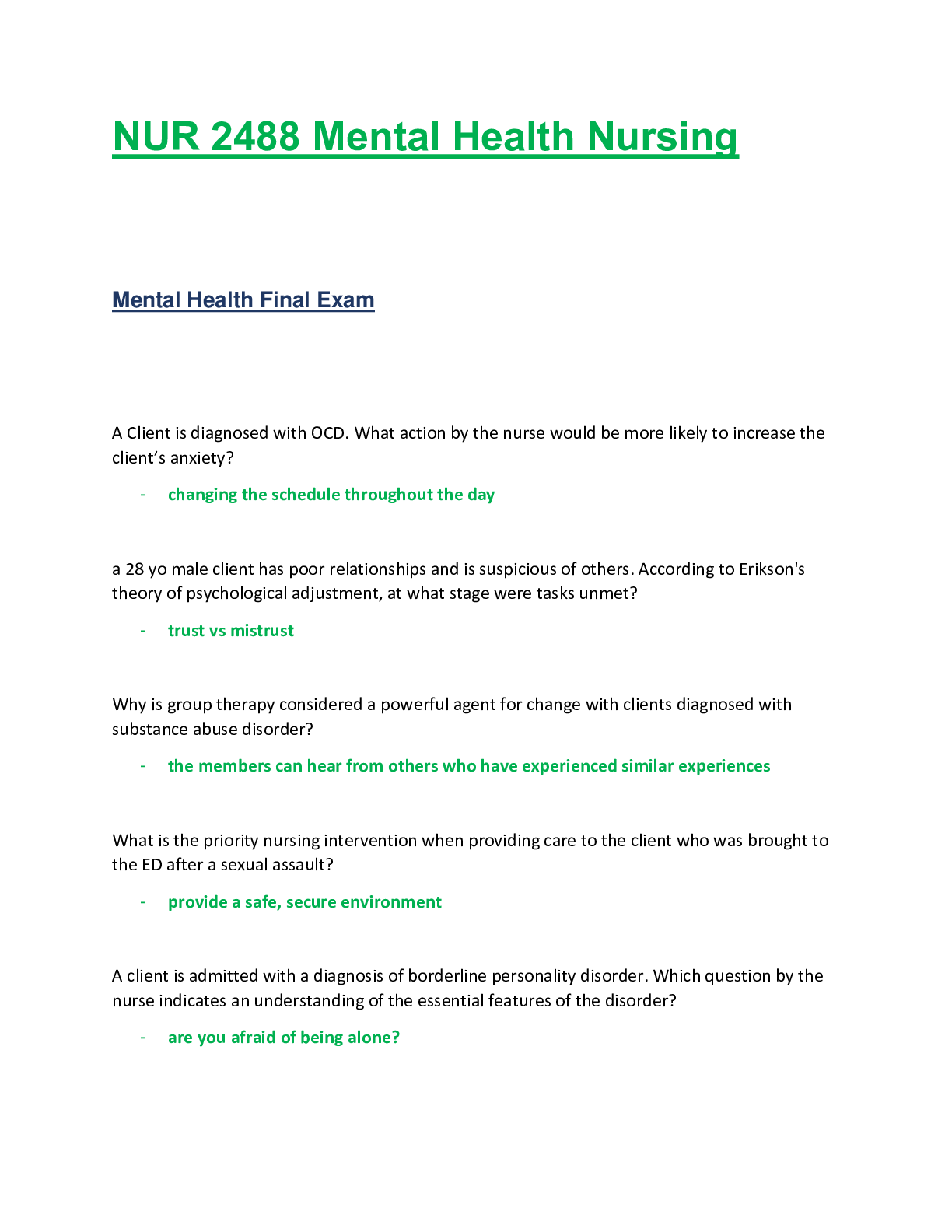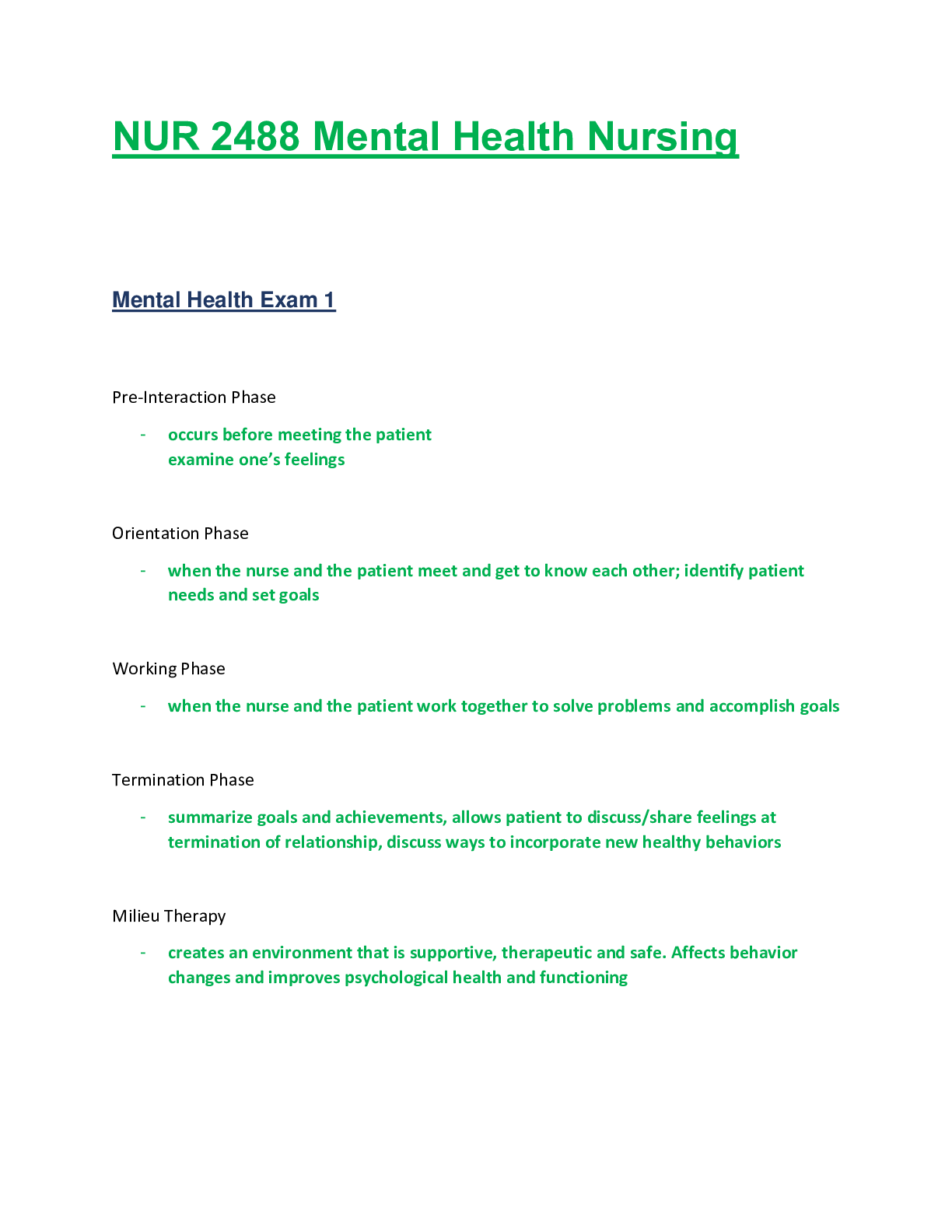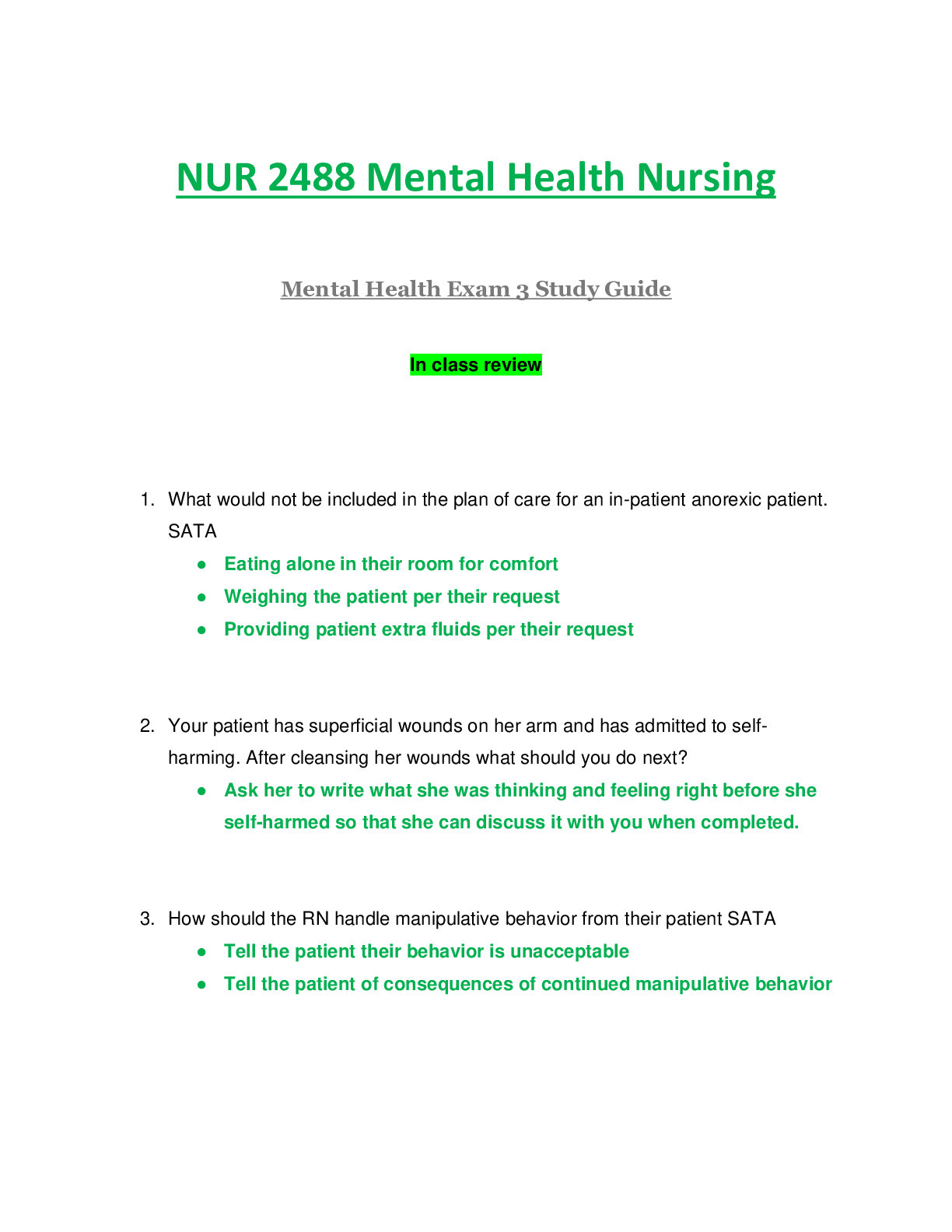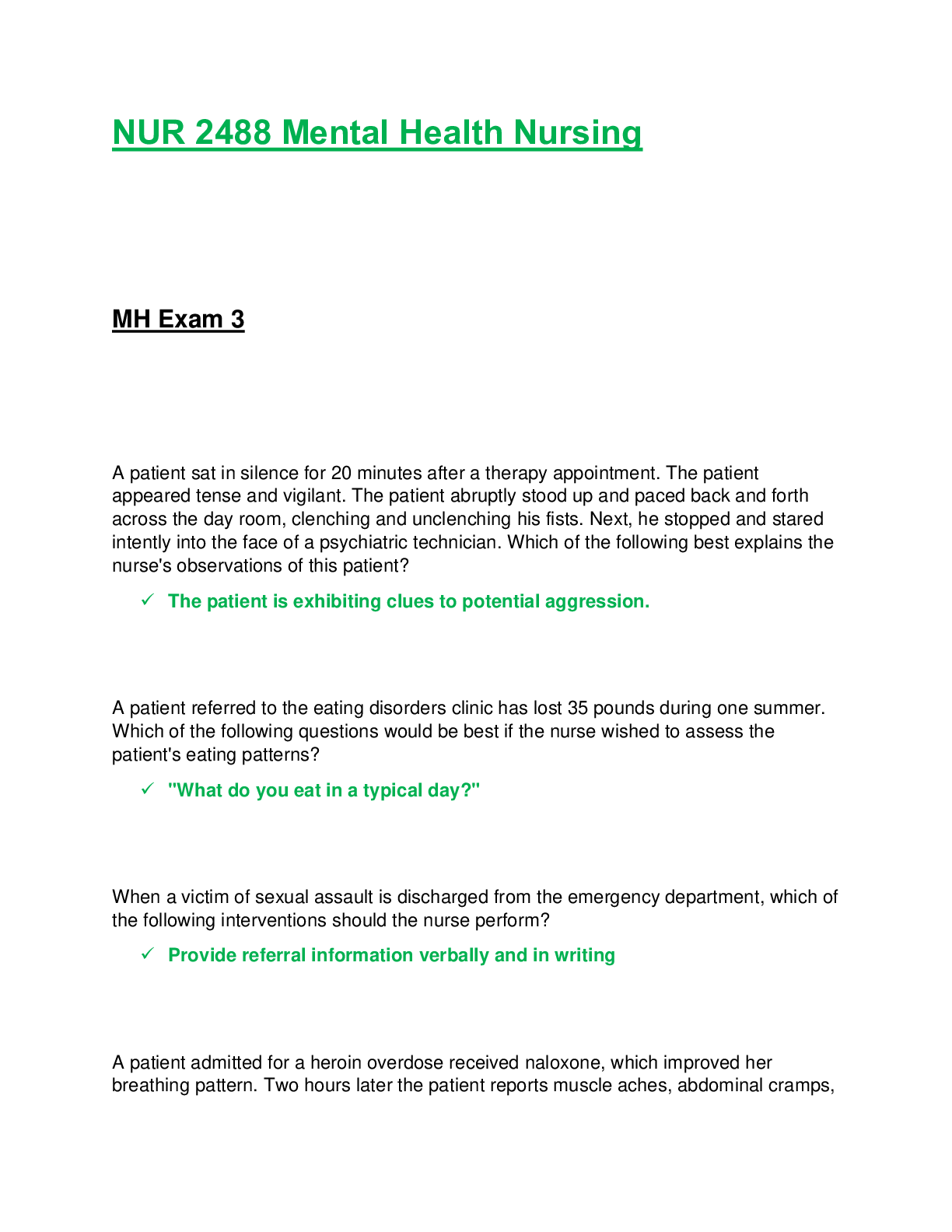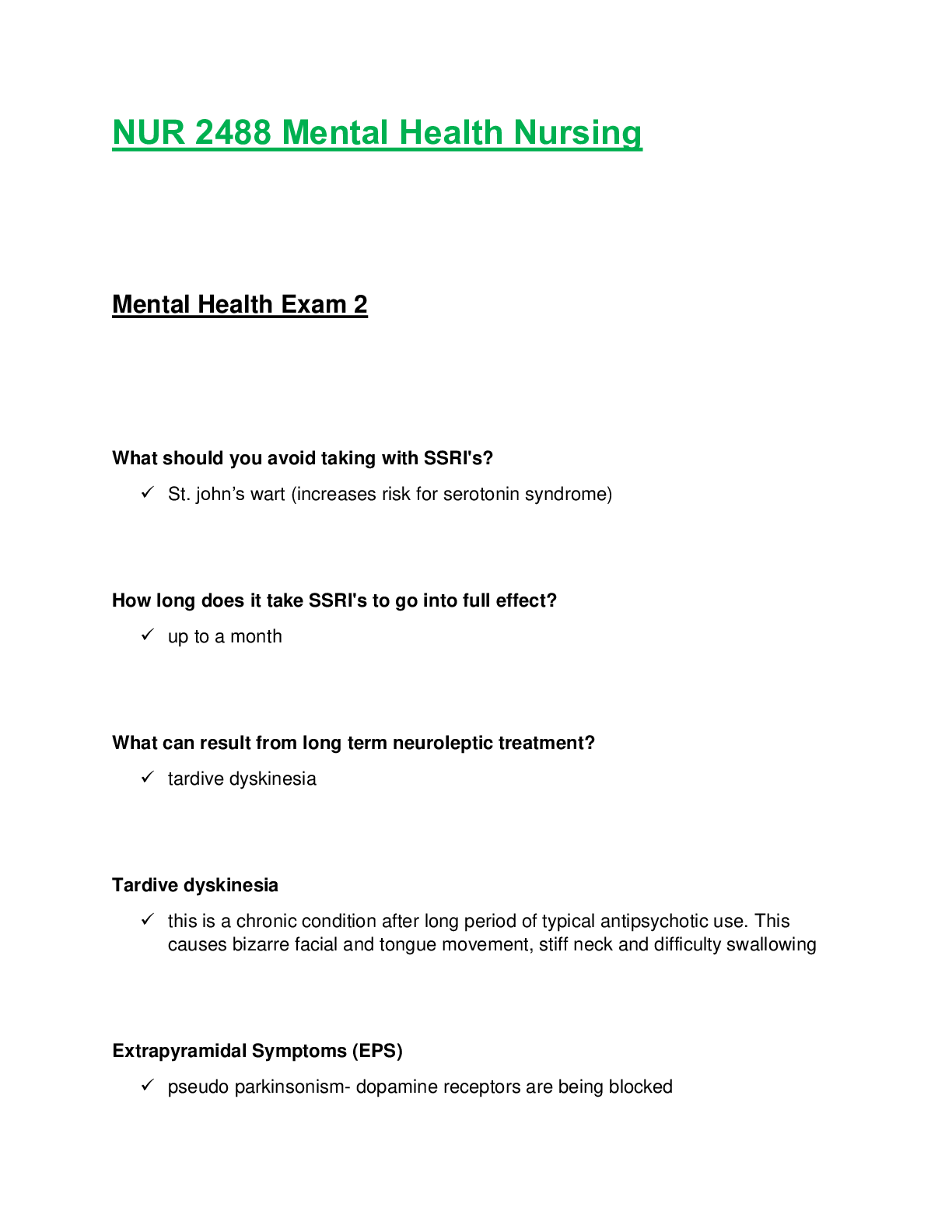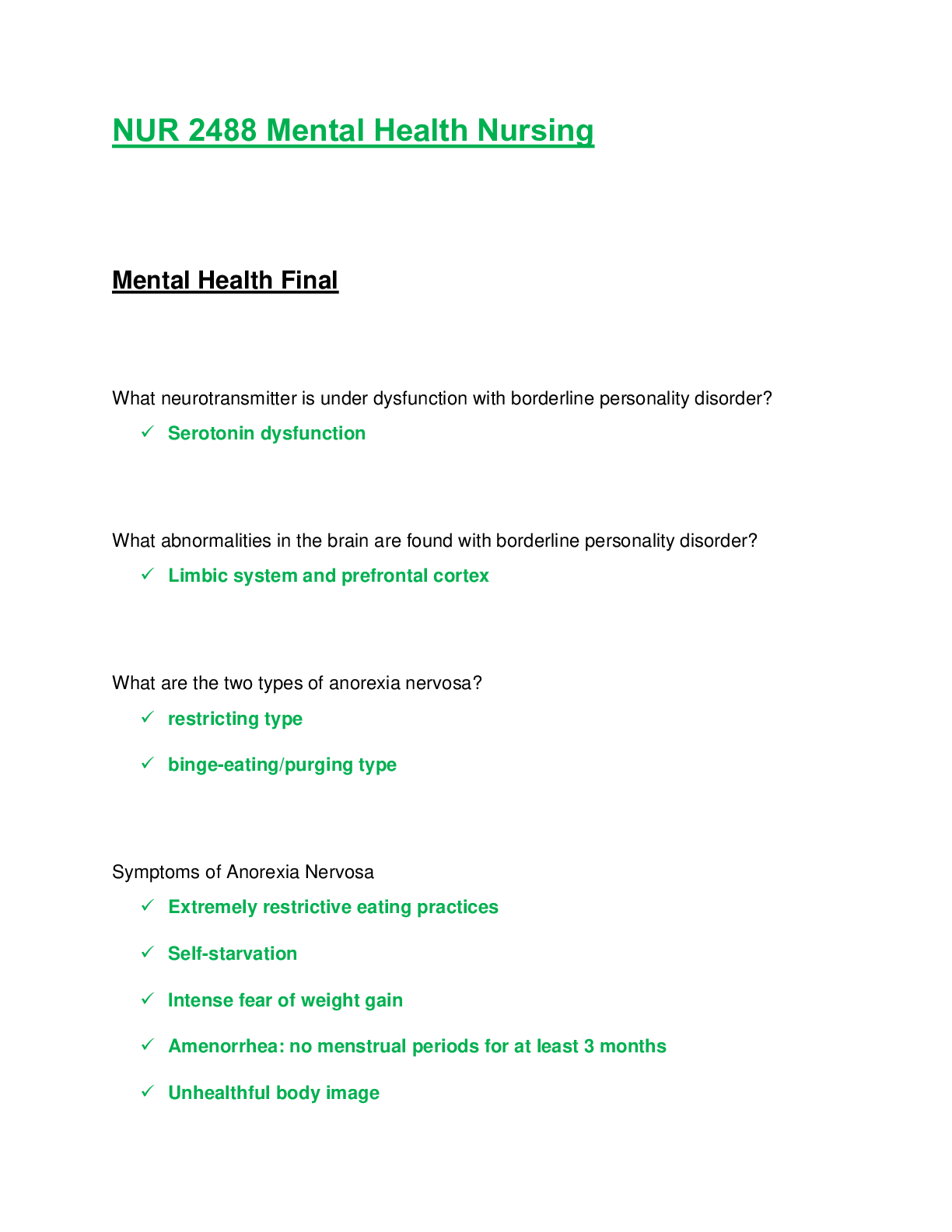*NURSING > EXAM > NUR 2488 Exam 3 ( 50 Q/A) / NUR2488 Exam 3 : Mental Health Nursing: Rasmussen College | 100 % VERIFI (All)
NUR 2488 Exam 3 ( 50 Q/A) / NUR2488 Exam 3 : Mental Health Nursing: Rasmussen College | 100 % VERIFIED ANSWERS, GRADED A
Document Content and Description Below
NUR2488 Mental Health Nursing Exam 3 (Latest): Rasmussen College NUR2488 Exam 3 / NUR 2488 Exam 2 (Latest): Mental Health Nursing: Rasmussen College • Question 1 A patient with a history of cocaine ... use reports a concurrent history of using other drugs in order to counteract the effects of cocaine. Which drug is this patient likely to have abused? Answers: PCP Alcohol Methylphenidate Caffeine • Question 2 A patient is admitted with a heart rate of 53 bpm, respirations 6/min, temp 96.8 and pinpoint pupils. Based on these clinical manifestations, what substance did this patient most likely overdose on? Answers: Opioids Alcohol Marijuana Amphetamine • Question 3 An elderly client with cognitive impairment is combative and pulled out a nasogastric tube, intravenous line, and indwelling urinary catheter. What can the nurse anticipate that the health care provider will most likely prescribe? Answers: A small dose of a selective serotonin reuptake inhibitor A large dose of a benzodiazepine A maintenance dose of buspirone A small dose of an atypical antipsychotic • Question 4 A nursing care plan contains the intervention “monitor for complications of refeeding syndrome.” Which body system should a nurse most closely monitor for clinical manifestations of dysfunction? Answers: Renal Central nervous Endocrine Cardiovascular • Question 5 Which of the following is the best example of all-or-nothing thinking, a common cognitive distortion of patients with an eating disorder? Answers: “If I gain any weight, I’ll keep going until I’m huge.” “When people tell me I’m looking better, they really mean I’m fatter.” “No one likes me because I’m fat.” “When I’m thin, I’m perfect.” • Question 6 A nurse reports to the interdisciplinary team that a patient with an antisocial personality disorder lies to other patients, verbally abuses a patient with Alzheimer’s disease, and flatters the primary nurse. This patient is detached and superficial during counseling sessions. Which behavior most clearly warrants limit setting? Answers: Lying to other patients Flattering the nurse Verbal abuse of another patient Detached superficiality during counseling • Question 7 Which of the following are primary characteristics of a person with borderline personality disorder? Answers: Demonstrates flexibility and compromise Demonstrates socially appropriate behaviors Demonstrates eagerness to learn new coping skills Demonstrated a self-defeating cycle of behavior • Question 8 A nurse is working with a patient with a histrionic personality disorder. Which of the following nursing interventions must be implemented throughout the inpatient stay? Answers: Setting appropriate limits on maladaptive behaviors Offering relationship advice Providing multiple options when the patient makes frequent requests Having the patient approach different staff members for interpretation of unit rules • Question 9 A patient has blindness related to conversion disorder. In order to assist the patient with eating, which of the following interventions should the nurse implement? Answers: Establish a “buddy” system with other patients who can feed this patient at each meal. Expect the patient to feed himself after explaining arrangement of the food on the tray. Address the needs of other patients in the dining room, then feed this patient. Direct the patient to locate items on the tray independently and feed himself unassisted. • Question 10 A patient is admitted for psychiatric observation after being arrested for breaking windows in the home of a former girlfriend who had refused to see him. His history reveals childhood abuse by a punitive father, torturing family pets, and an arrest for disorderly conduct. Which nursing diagnosis has priority in the plan of care? Answers: Risk for injury Post-trauma syndrome Disturbed thought processes Risk for other-directed violence • Question 11 A patient is referred to the mental health center by the family health care provider. Over the past year, the patient has cooked gourmet meals for family members, but eats only tiny portions of the food. The patient wears layers of loose clothing, saying, “It’s just my style.” The patient’s weight has dropped from 130 to 95 pounds. The patient has amenorrhea. Which medical diagnosis are the history and symptoms are most consistent with? Answers: Anorexia nervosa Bulimia nervosa Binge eating Eating disorder not otherwise specified • Question 12 A patient sat in silence for 20 minutes after a therapy appointment. The patient appeared tense and vigilant. The patient abruptly stood up and paced back and forth across the day room, clenching and unclenching his fists. Next, he stopped and stared intently into the face of a psychiatric technician. Which of the following best explains the nurse’s observations of this patient? Answers: The patient is demonstrating withdrawal The patient is working off angry feelings. The patient is using relaxation strategies effectively. The patient is exhibiting clues to potential aggression. • Question 13 A patient referred to the eating disorders clinic has lost 35 pounds during one summer. Which of the following questions would be best if the nurse wished to assess the patient’s eating patterns? Answers: “Do you often feel fat?” “Who plans the family meals?” “What do you eat in a typical day?” “What do you think about your present weight?” • Question 14 When a victim of sexual assault is discharged from the emergency department, which of the following interventions should the nurse perform? Answers: Notify the patient’s family of the event to seek support for the patient Provide referral information verbally and in writing Offer to stay with the patient until stability is regained Advise the patient to try not to think about the assault • Question 15 A patient admitted for a heroin overdose received naloxone, which improved her breathing pattern. Two hours later the patient reports muscle aches, abdominal cramps, and gooseflesh, and says, “I feel terrible.” Which is the correct analysis of this assessment? Selected Answer: The patient should be monitored closely for seizures Answers: A peculiar reaction to naloxone is occurring The patient should be monitored closely for seizures The patient is experiencing a relapse Symptoms are present due to abrupt cessation of narcotic • Question 16 A health care provider writes these new prescriptions for a nursing home resident: 2-g sodium diet; restraints as needed for behavioral problems; limit fluids to 2000 mL daily; continue antihypertensive medication; milk of magnesia 30 mL orally one time as needed if no bowel movement for 3 days. Which of the following is most appropriate for the nurse to do first? Selected Answer: Clarify the order for restraints Answers: Clarify the order for fluid restriction Clarify the order for restraints Transcribe all orders as written Clarify the order for milk of magnesia • Question 17 The son of an elderly client with dementia is talking to the nurse about discharge. He indicates that his father’s physician has given him 48 hours to decide on a living situation. The nurse discusses possible living arrangements and provides contact information. The nurse knows that the son requires further teaching when he says: Answers: I have quite a decision to make. I want the social worker to decide if he should stay home or go to assisted living so he doesn’t blame me. Well I guess we can try him at home and if it doesn’t work out, I can move him to assisted living later. I think Dad would rather be at home and I think my sister and I can do it. We’ll talk to this home care agency. • Question 18 A child with ADHD will begin medication therapy. Which of the following classifications of medications should the nurse prepare to teach the patient and family about? Answers: Central nervous system stimulants Monoamine oxidase inhibitors (MAOIs) Antipsychotic medications Anxiolytic medications • Question 19 Which of the following nursing interventions is the highest priority while working with a patient who has a somatoform disorder for the first time? Answers: Help the patient shift focus from somatic symptoms to feelings. Imply that somatic symptoms are not real. Help the patient suppress feelings of anger. Assess for objective data to support the patient’s report of each physical symptom. • Question 20 The nurse is assessing a patient who has been diagnosed with hypochondriasis. Which clinical manifestation would the nurse most likely assess in this patient? Answers: Loss of interest in formerly pleasurable activities Repetitive, time-consuming rituals Deliberate fabrication of symptoms for an obvious benefit Misinterpretation of physical sensations as evidence of serious illness • Question 21 While providing health teaching for a patient with binge-purge bulimia, what information is most important for the nurse to prioritize? Answers: self-monitoring of daily food and fluid intake establishing the desired daily weight gain symptoms of hypokalemia self-esteem maintenance • Question 22 An 11-year-old is absent from school to stay at home and care for siblings while the parents work. The family cannot afford a babysitter. When asked about the parents, the child reluctantly says, “I don’t think my parents like me very much. They call me stupid and say I never do anything right.” Which type of abuse is most likely? Answers: Physical Sexual Emotional Economic • Question 23 The student nurse is asked to provide a general and concise description of persons with personality disorders. Which of the following would be the best description? Answers: “They can tolerate high levels of stress.” “They have difficulties in social, family and work relationships.” “They are good at compromise and often function as mediators.” “They often seek instructions to learn better coping behaviors.” • Question 24 A nurse in the emergency department tells the daughter of an older adult woman, “Your mother had a severe stroke.” The daughter tearfully says, “Who will take care of me now? My mother always tells me what to do, what to wear, and what to eat. I need someone to reassure me when I get anxious.” This behavior could best be assessed as: Answers: Histrionic. Dependent. Narcissistic. Borderline. • Question 25 Which behavior best describes physical aggression? Answers: Stomping away from the nurses’ station, going to the day room, and grabbing a pool cue from a patient standing at the pool table Bursting into tears, leaving the community meeting, and sitting on a bed hugging a pillow and sobbing Telling the primary nurse, “When you told me that I could not have a second helping at lunch, I felt angry.” Telling the medication nurse, “I am not going to take that, or any other, medication.” • Question 26 Which nursing intervention(s) would be most likely included in a plan of care for a patient with bulimia nervosa? Select all that apply. Explore needs for health teaching. Answers: Assist the patient to identify triggers to binge eating. Provide remedial consequences for weight loss Assess for signs of impulsive eating. Explore needs for health teaching. • Question 27 An older adult patient with Alzheimer’s disease lives with family and goes to day care on weekdays. The nurse at the center observed poor hygiene and discussed this observation with the caregiver, the patient’s adult child. The caregiver became defensive and said, “It takes all my time and energy to care for my mother. She’s awake all night. Last night she fell down the stairs.” Which nursing intervention takes highest priority in this case? Answers: Teach the caregiver more about the effects of Alzheimer’s disease Secure additional safety measures for the mother’s evening and night care Support the caregiver to grieve the loss of the mother’s ability to function Teach the family how to give physical care more effectively and efficiently • Question 28 Which patient statement would be best documented as a subjective assessment finding supporting a psychiatric diagnosis of dissociative fugue? Answers: “I cannot recall why I’m living in this town.” “I hear a male voice telling me to drink this poison.” “I feel very anxious and worried about my problems.” “I feel like I am on top of the world and want to tell everyone about it.” • Question 29 A patient admitted yesterday for injuries sustained in a fall while intoxicated believes the window blinds are snakes trying to get in the room. The patient is anxious, agitated, and diaphoretic. Which medication can the nurse anticipate the health care provider will prescribe? Answers: A benzodiazepine, such as lorazepam or chlordiazepoxide A phenothiazine, such as chlorpromazine or thioridazine A monoamine oxidase inhibitor, such as phenelzine A narcotic analgesic, such as codeine • Question 30 A patient is pacing the hall near the nurses’ station, swearing loudly. Which of the following best describes how the nurse should address this situation in a therapeutic manner? Answers: “Please quiet down.” “Hey, you’re too loud. It’s bothering people” “You seem upset. Will you tell me more about it?” “You need to go to your room to get control of yourself.” • Question 31 Which of the following nursing interventions are necessary after administration of naloxone (Narcan)? Answers: Monitor airway. Vital signs every 15 minutes. Insert an indwelling urinary catheter. Insert a nasogastric tube and test gastric pH. Treat hyperpyrexia with cooling measures • Question 32 What is a nurse’s legal responsibility if child abuse or neglect is suspected? Answers: Discuss the findings with the child’s teacher, principal, and school psychologist Report the suspected abuse or neglect according to state regulations Document the observations and speculations in the medical record Continue the assessment. • Question 33 What is the priority nursing diagnosis for a patient who is experiencing fluctuating levels of consciousness, disturbed orientation, and visual and tactile hallucinations? Answers: Bathing/hygiene self-care deficit related to altered cerebral function, as evidenced by confusion and inability to perform personal hygiene tasks Risk for injury related to altered cerebral function, misperception of the environment, and unsteady gait Disturbed thought processes related to medication intoxication, as evidenced by confusion, disorientation, and hallucinations Fear related to sensory perceptual alterations, as evidenced by hiding from hallucinated dog and asking nurse to remove hallucinated bugs from legs • Question 34 Nurses working in a family planning clinic for women routinely ask clients about whether they have experienced domestic violence. The purpose of having this question in the assessment tool is that: Answers: Identifies women who should be taking birth control. A woman experiencing domestic violence may not seek out help It assists law enforcement in identifying perpetrators of violence It ensures compliance with the health care plan • Question 35 An alcohol-dependent patient was hospitalized at 0200 today. When would the nurse expect withdrawal symptoms to peak? Answers: Between 0800 and 1000 today (6 to 8 hours after drinking stopped) Between 0200 tomorrow and hospital day 2 (24 to 48 hours after drinking stopped) About 0200 on hospital day 3 (72 hours after drinking stopped) About 0200 on hospital day 4 (96 hours after drinking stopped) • Question 36 Which is an important nursing intervention when giving care to a patient withdrawing from a CNS stimulant? Answers: Make physical contact by frequently touching the patient. Offer intellectual activities requiring concentration. Observe for depression and suicidal ideation. Avoid manipulation by ignoring patient requests • Question 37 Which of the following clinical manifestations should the nurse expect to assess in a 2-year-old with suspected autistic disorder? Answers: Hyperactivity and attention deficits Failure to display affection toward others, such as hugging or touching a parent A history of disobedience and destructive acts High levels of anxiety when separated from the parent • Question 38 The nurse working on a memory care unit hears her client in a group of his peers reminiscing about his past. How might this behavior affect the client’s daily functioning on the unit? Answers: Reminiscing will increase his confusion by dwelling on the past. The client may feel less isolated and lonely. The client could become depressed about his losses. Thinking about the past will keep the client from participating in other activities. • Question 39 Which child shows behaviors that are most indicative of a potential mental illness? Answers: A 3-month-old who cries after feeding until burped and sucks a thumb A 6-month-old who does not eat vegetables well and likes to be rocked A 3-year-old who is mute, passive toward adults, and twirls while walking A 4-year-old who lisps and wets the bed after the birth of a sibling • Question 40 A patient being assessed for somatoform pain disorder says, “My pain is from an undiagnosed injury. I can’t perform my own activities of daily living or walk 20 minutes. I have to take pain medicine six or seven times a day. I feel like a baby because my family has to provide so much care for me.” Which of the following does the nurse understand is most important to include as part of this assessment? Answers: mood. cognitive style. secondary gain. identity and memory • Question 41 A 70-year-old client is admitted to the locked psychiatric unit, diagnosed with delirium. Later in the day, he tries to get out of the locked unit several times. He yells, "I have to leave and get to my barber. I see him every Wednesday. Let me out!” The most therapeutic response by the nurse would be: Answers: "You need to come and take a shower before you can go get your hair cut." "Please stop banging on the door. Your room is right over there. " "The door is locked so that you don’t leave and get hurt." "It's Monday and you’re in the hospital. I'm your nurse." • Question 42 Which intervention is most effective in managing excessive demands from a client with borderline personality disorder? Answers: Assign two staff members per shift to this client. Hold a quick staff meeting whenever the client has a complaint Be consistent in responses to client demands. Be flexible and willing to change your mind • Question 43 A client is admitted for acute alcohol withdrawal. Which of the following clinical manifestations indicate the need for treatment of acute alcohol withdrawal? Answers: Myopia, hypothermia, and elevated mood. Bradycardia, hypotension and drowsiness. Decreased reflexes, somnolence and hypothermia. Tachycardia, paranoid delusions, and elevated blood pressure • Question 44 A client with vascular dementia is experiencing agnosia. She sits at her dining table looking at her food, but doesn’t pick up a utensil and try to eat. Which intervention is most appropriate for the nurse to try first? Answers: Send the food back to the kitchen and try something else. Help the client by feeding her. Hand the fork to the client and say, “Use this fork to eat your meat loaf.” Tell the client, “It's time to start eating. Those potatoes look good” • Question 45 A nurse is preparing a care plan for a newly admitted patient diagnosed with body dysmorphic disorder. Which nursing diagnosis would be highest priority for the plan of care? Answers: Anxiety Risk for suicide Ineffective role performance Disturbed body image • Question 46 Which of the following statements best indicates a client is utilizing an individualized relapse prevention plan as part of recovery from alcohol dependence? Answers: “I can stay sober on my own, without a support system because I am strong-willed.” “I have to work on my own recovery once a week”. “I need to identify what situations I have difficulty handling”. “I limit myself. I only go to the bars to socialize with other people.” • Question 47 Which of the following interventions are included as part of milieu management in the plan of care for a patient with anorexia who is admitted for inpatient treatment? Select all that apply. Adherence to a selected menu Observation during and after meals Monitoring during bathroom trips Answers: Meals delivered to patient in room to allow for eating without observation Adherence to a selected menu Observation during and after meals Unscheduled weight checks Monitoring during bathroom trips • Question 48 The nurse is caring for a client who is receiving treatment for an overdose of phencyclidine piperidine (PCP). Which of the following interventions would the nurse expect to see as part of a collaborative plan of care? Answers: Monitor vital signs once daily Administer epinephrine Administer a benzodiazepine Wrap the patient in warm blankets • Question 49 Which scenario bet predicts the highest risk for a patient who may direct violent behavior toward others? Answers: Obsessive-compulsive disorder; performs many rituals Paranoid delusions of being followed by members of the mafia Severe depression with delusions of worthlessness. Completed alcohol withdrawal; beginning a rehabilitation program. • Question 50 An older adult patient in the intensive care unit has visual and auditory illusions. Which intervention will be most helpful to the patient in managing these illusions? Answers: Placing large clocks and calendars on the wall Placing personally meaningful objects in view Wearing glasses and hearing aids Keeping the room dimly lit constantly [Show More]
Last updated: 1 year ago
Preview 1 out of 25 pages
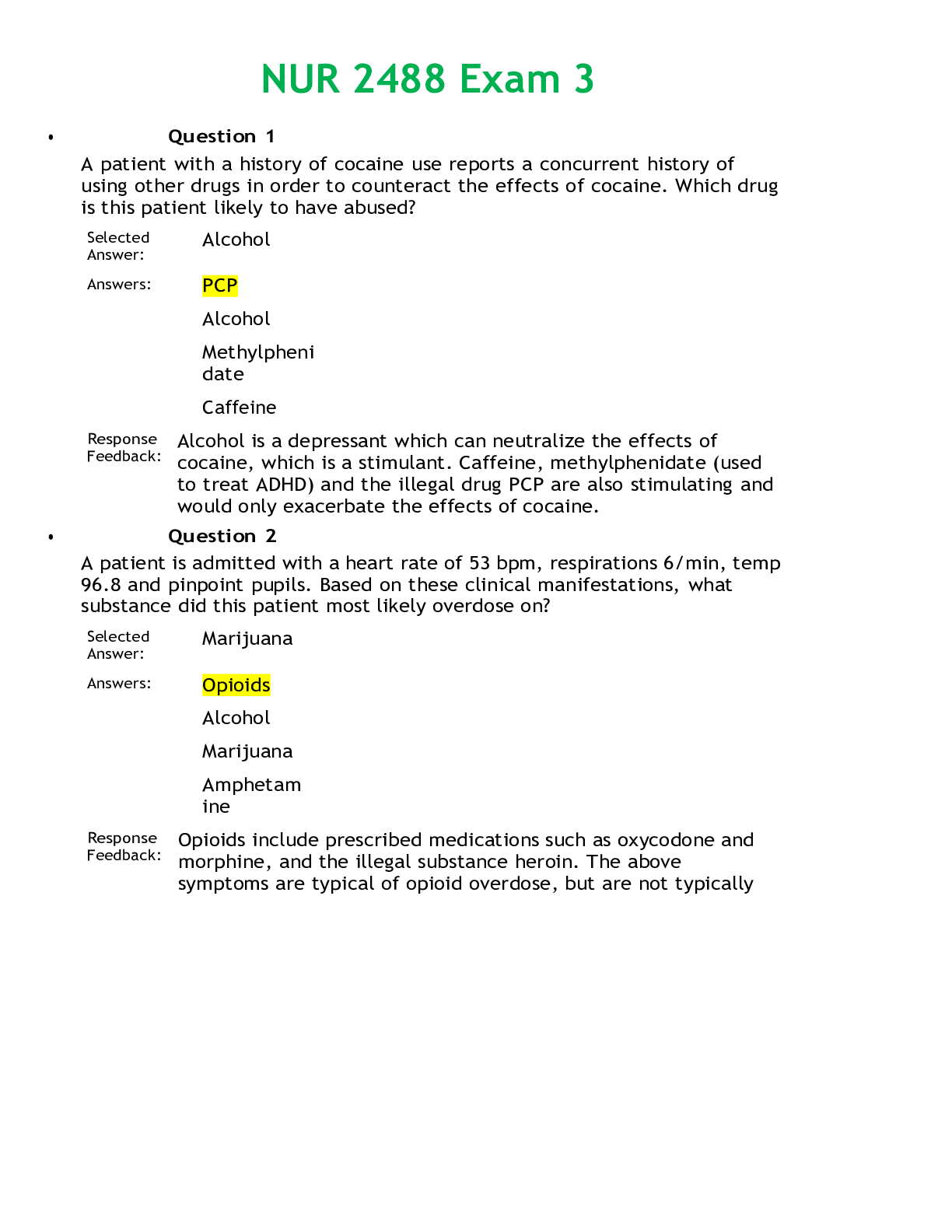
Reviews( 0 )
Document information
Connected school, study & course
About the document
Uploaded On
Apr 05, 2021
Number of pages
25
Written in
Additional information
This document has been written for:
Uploaded
Apr 05, 2021
Downloads
2
Views
127
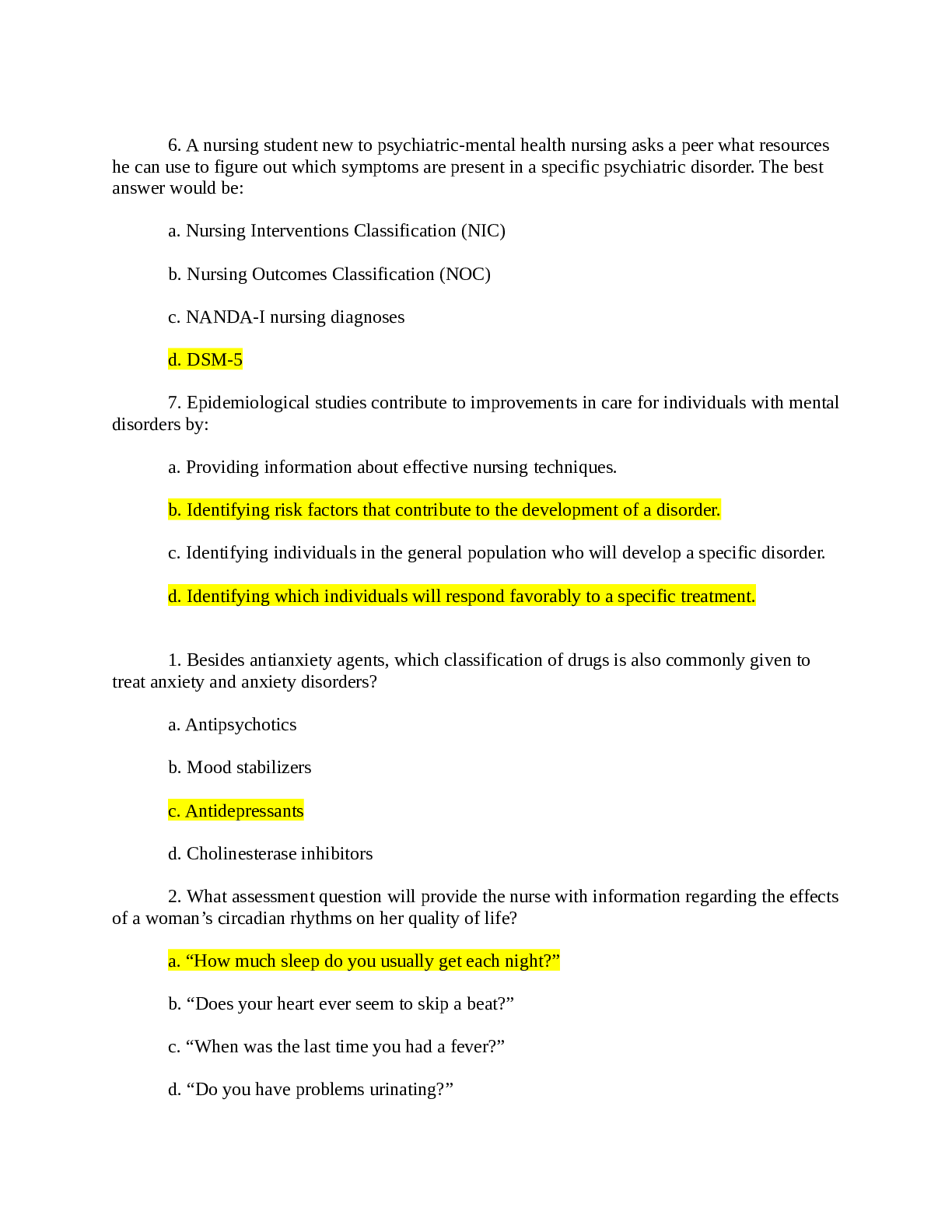

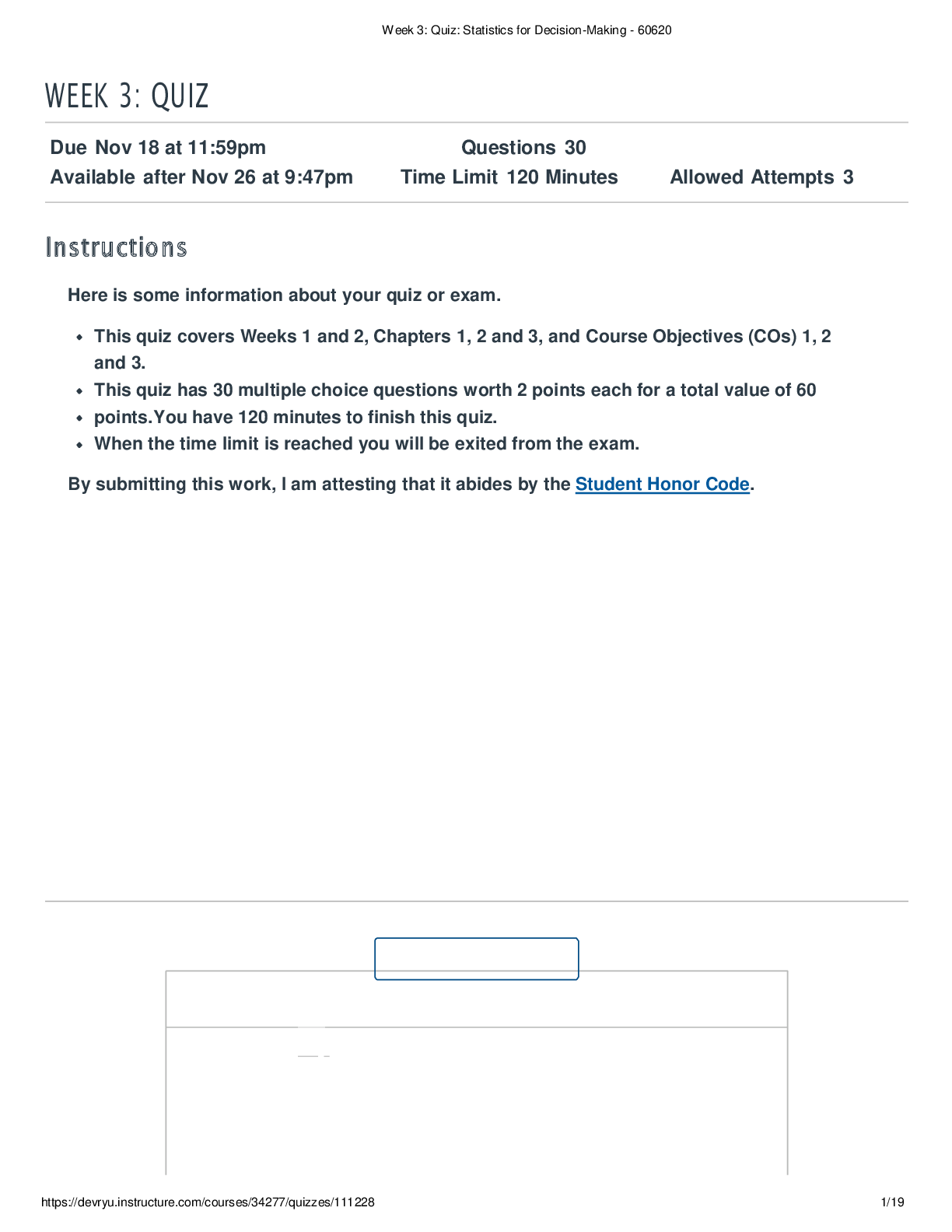
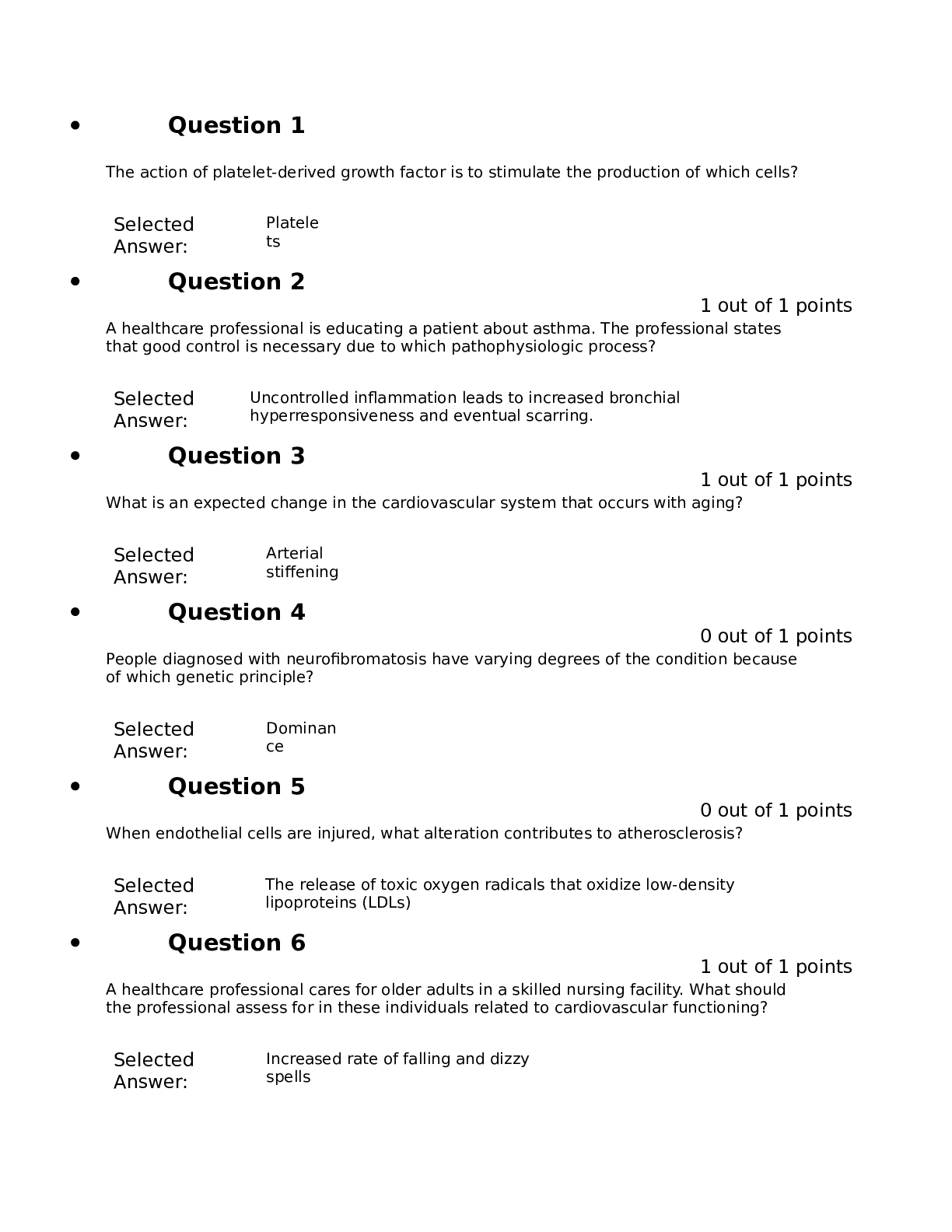
.png)
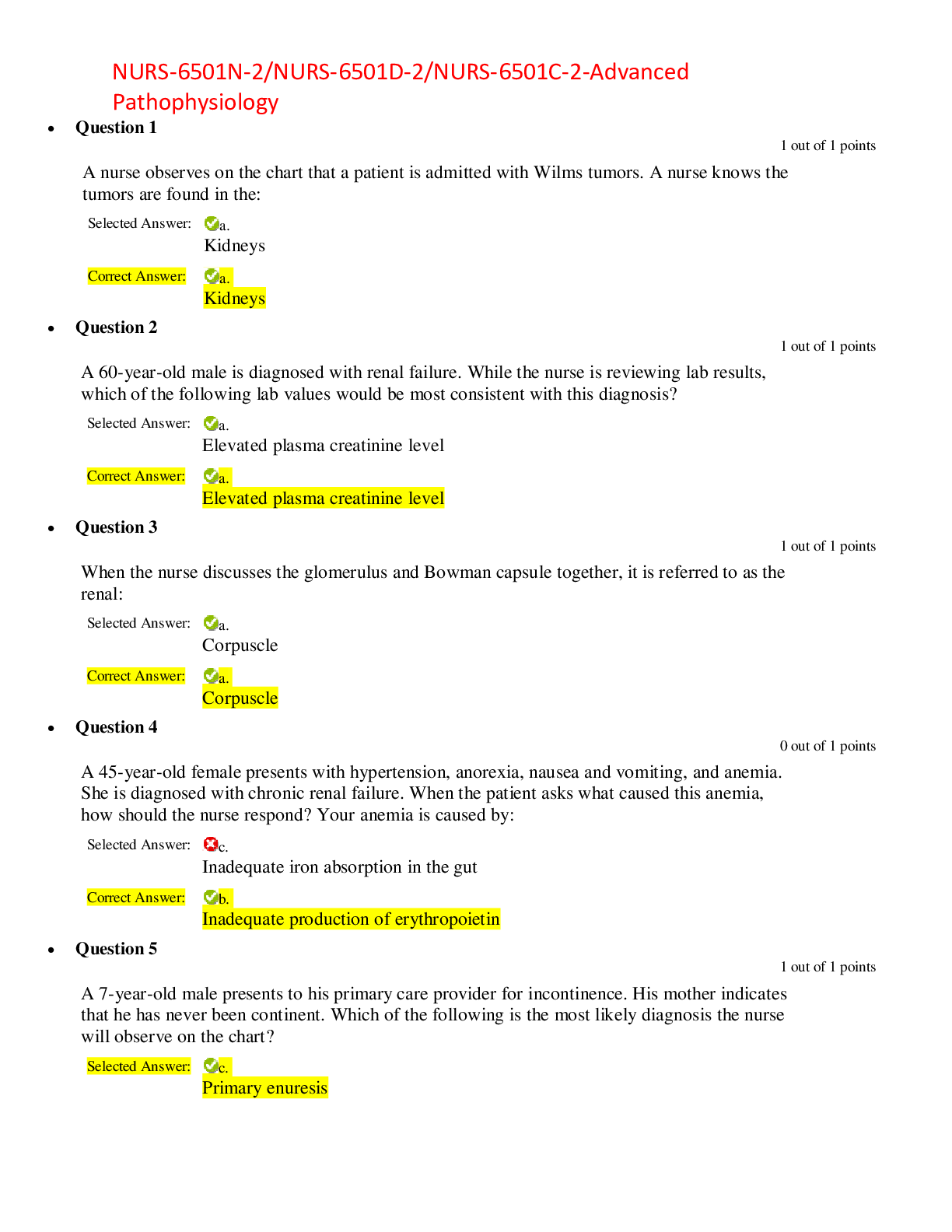
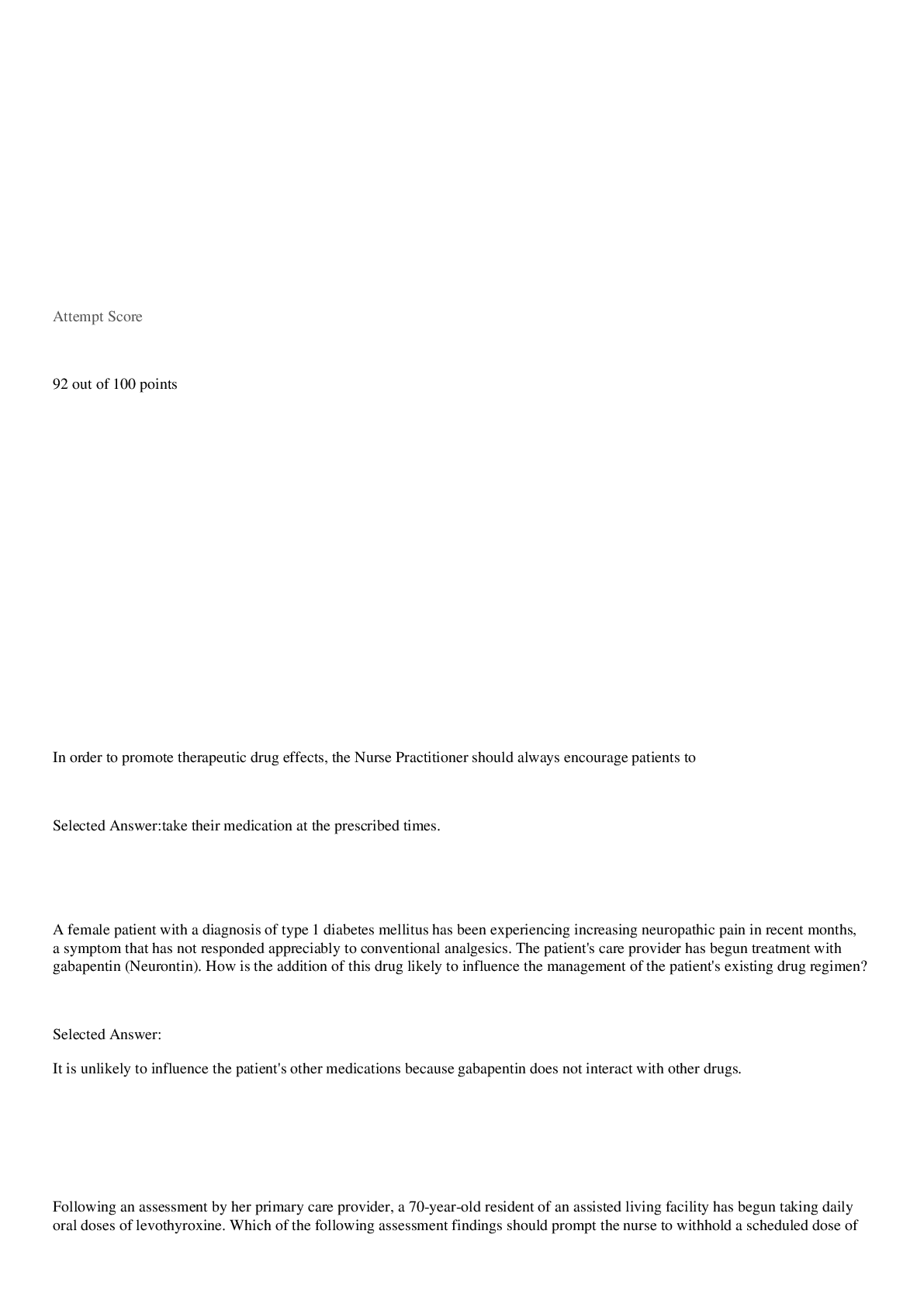
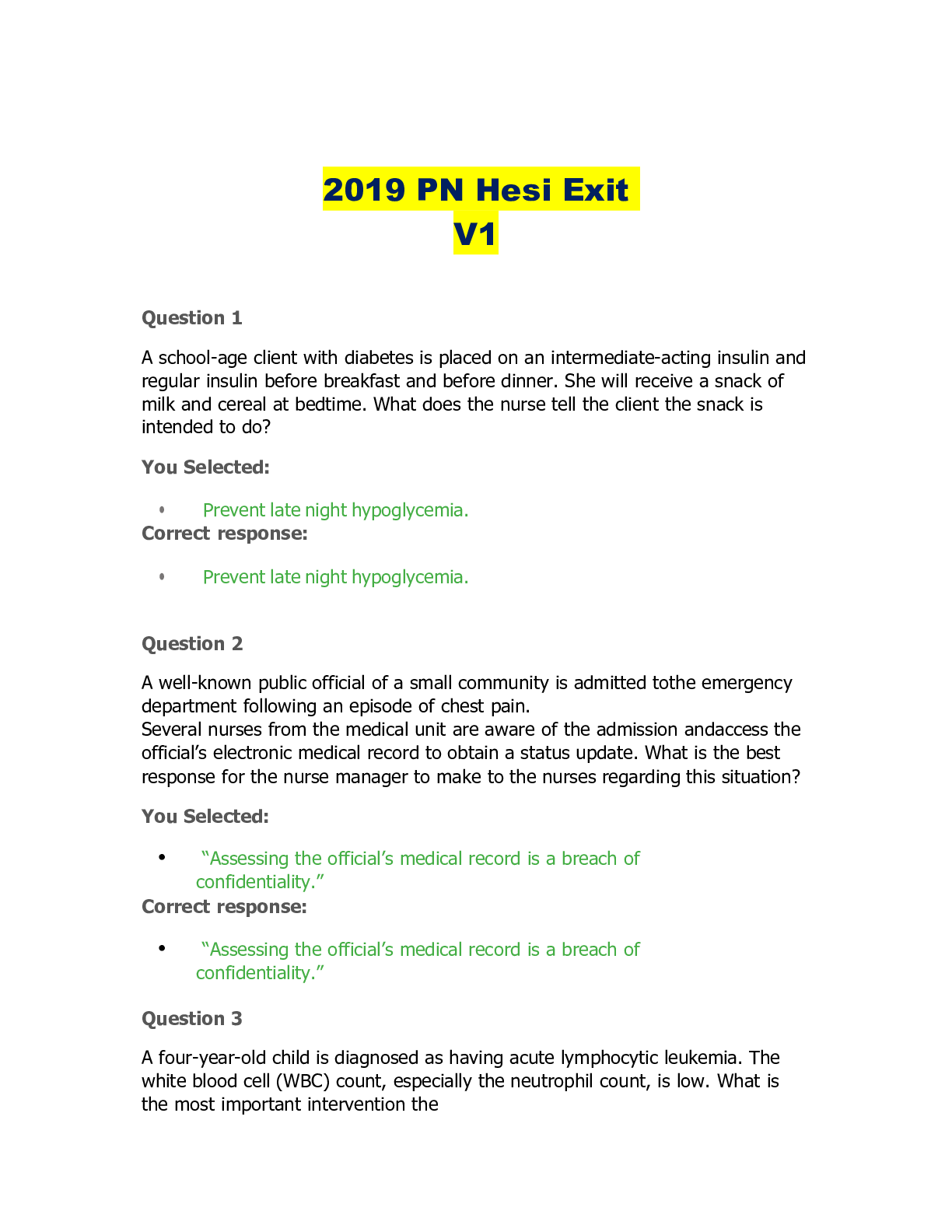
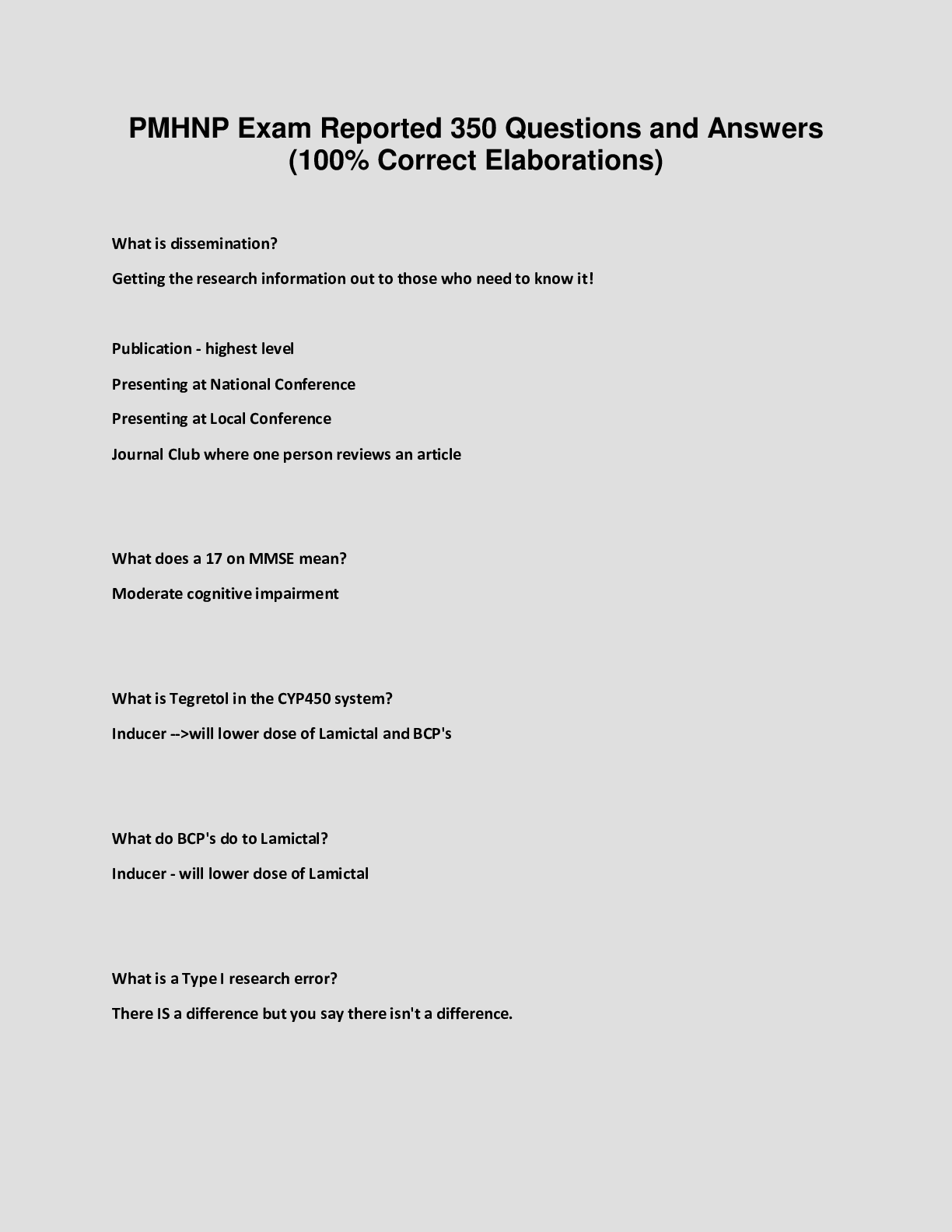
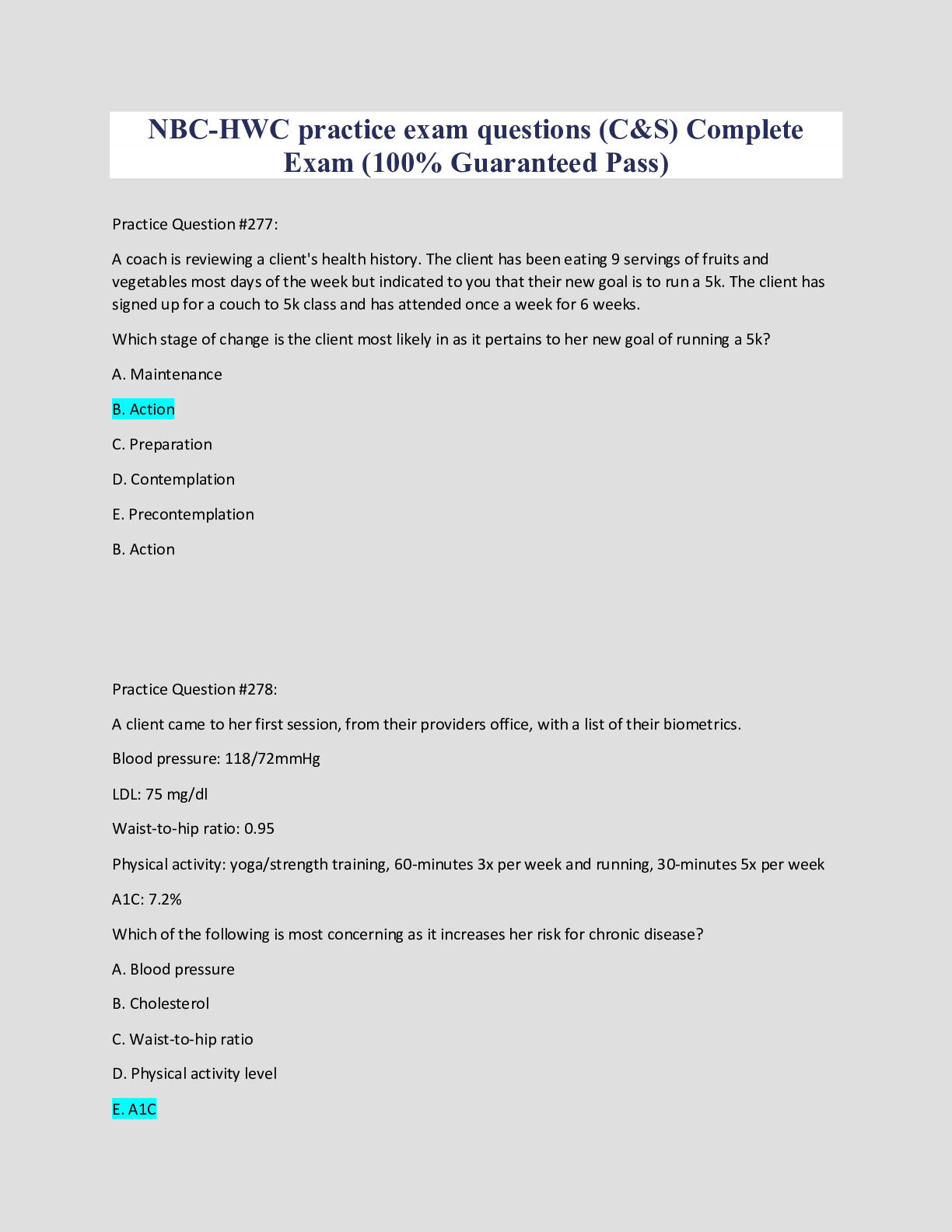
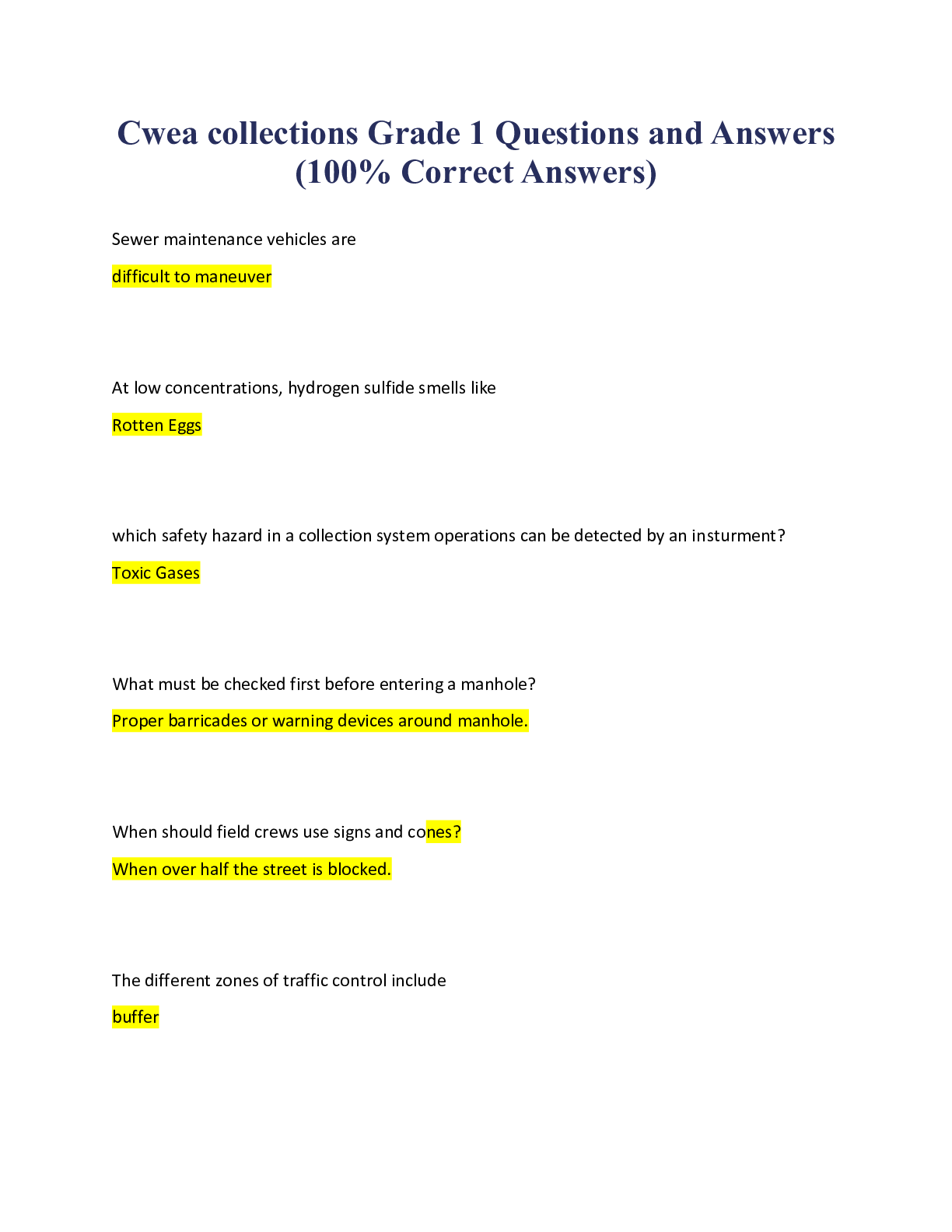
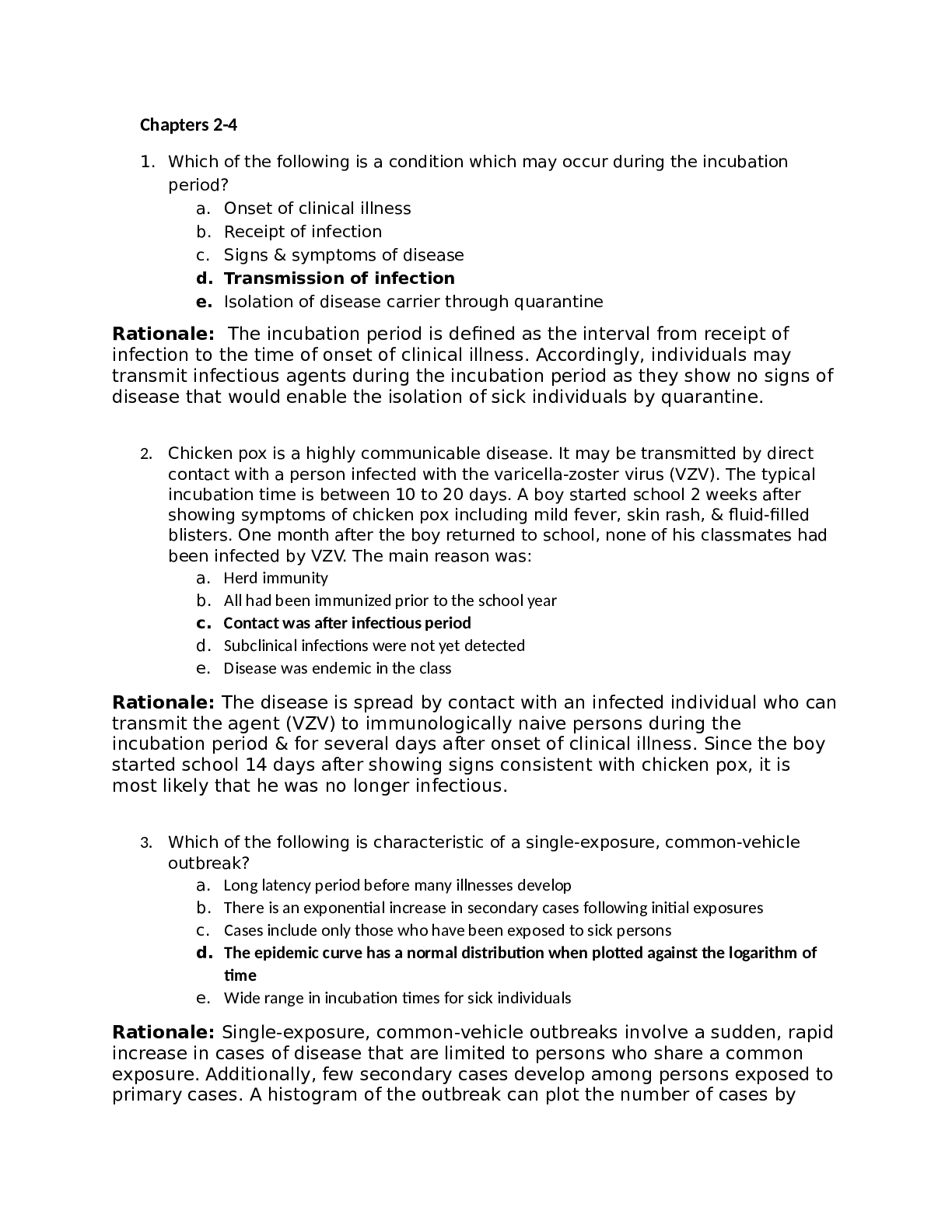
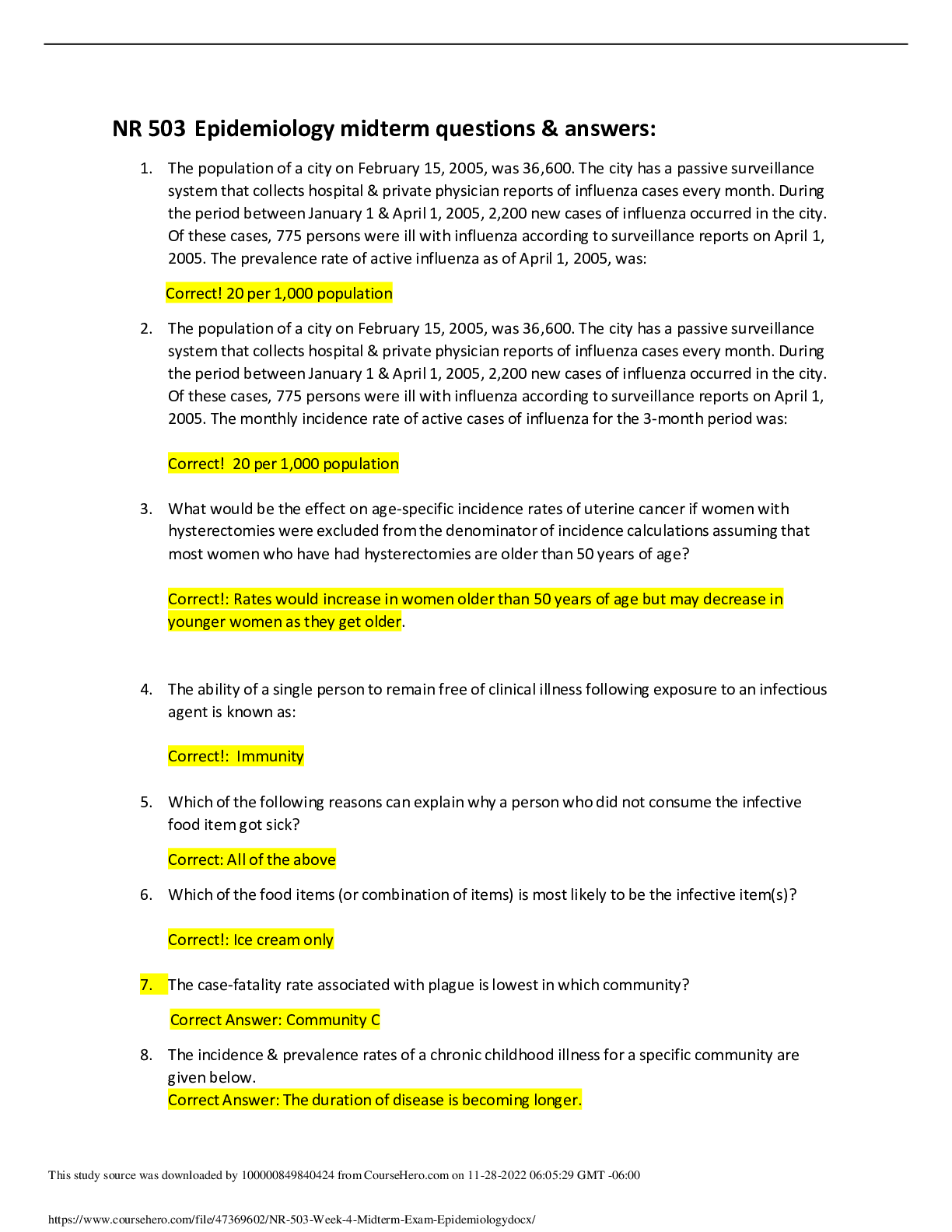
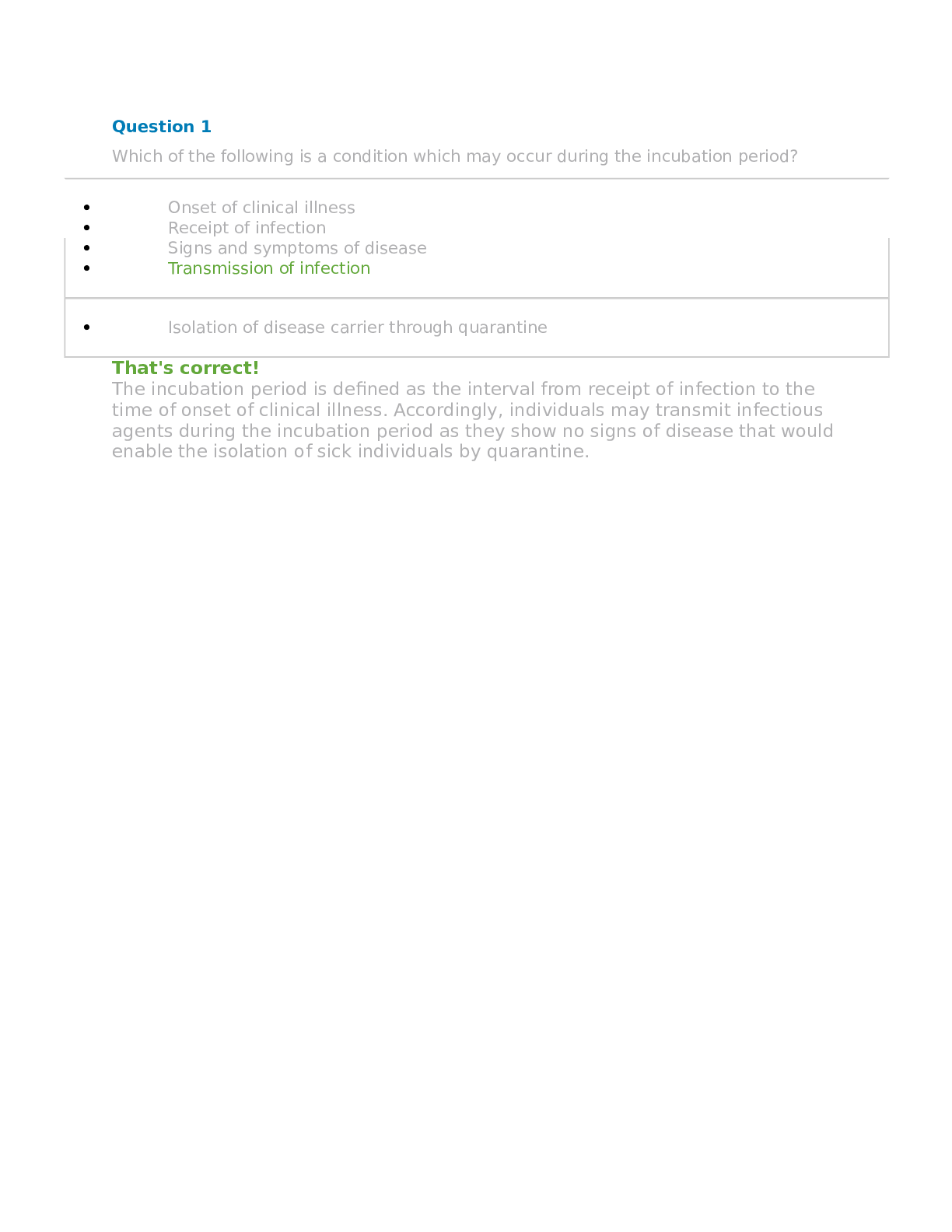
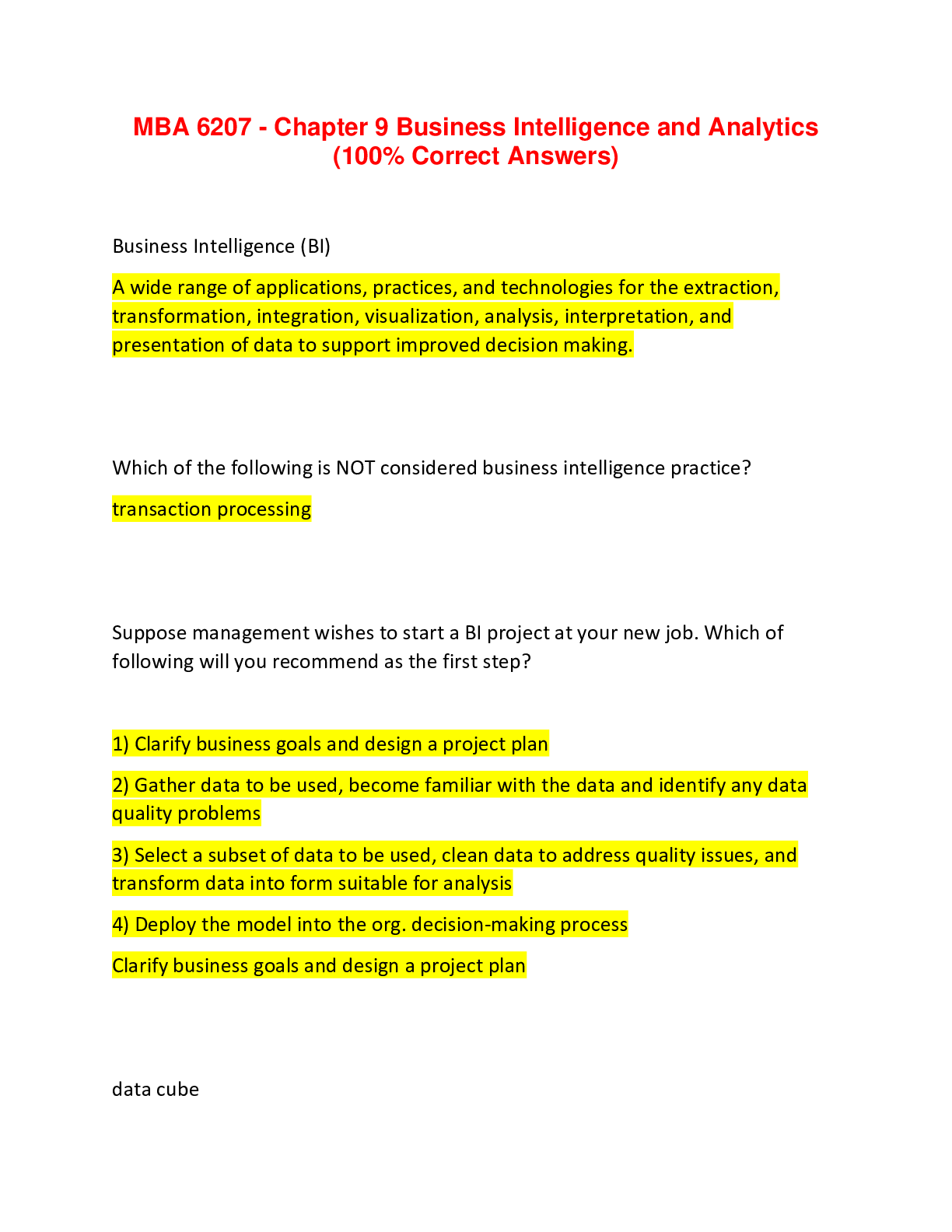
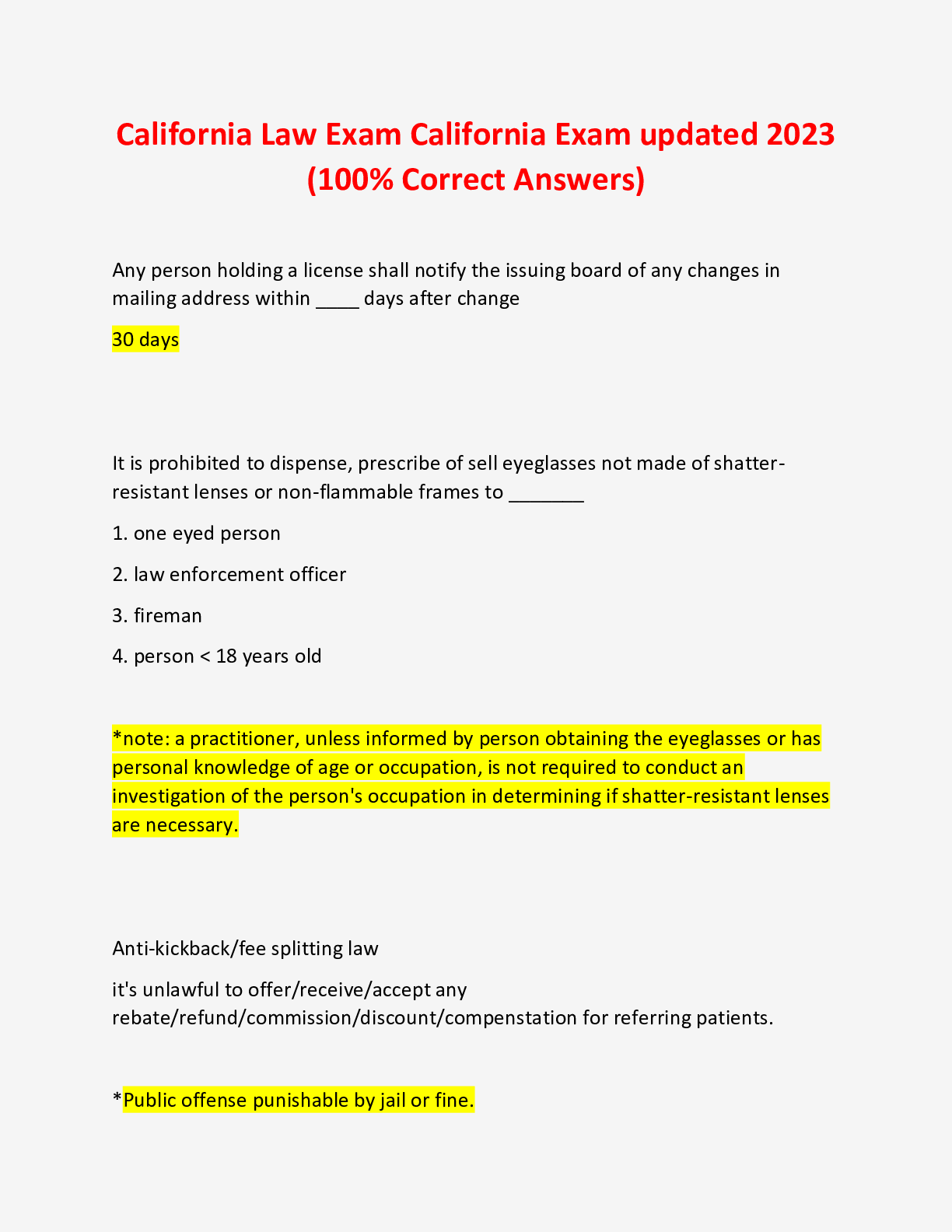
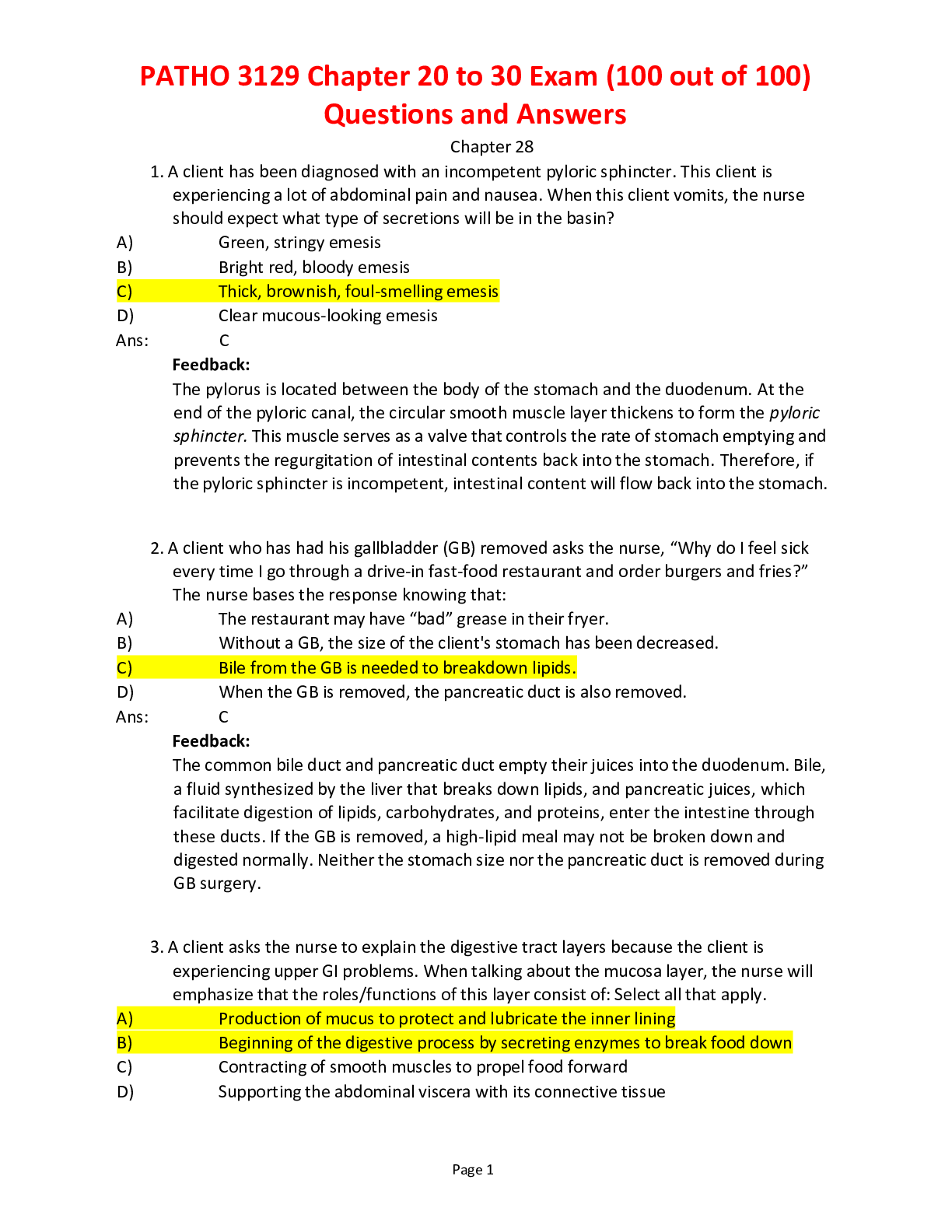
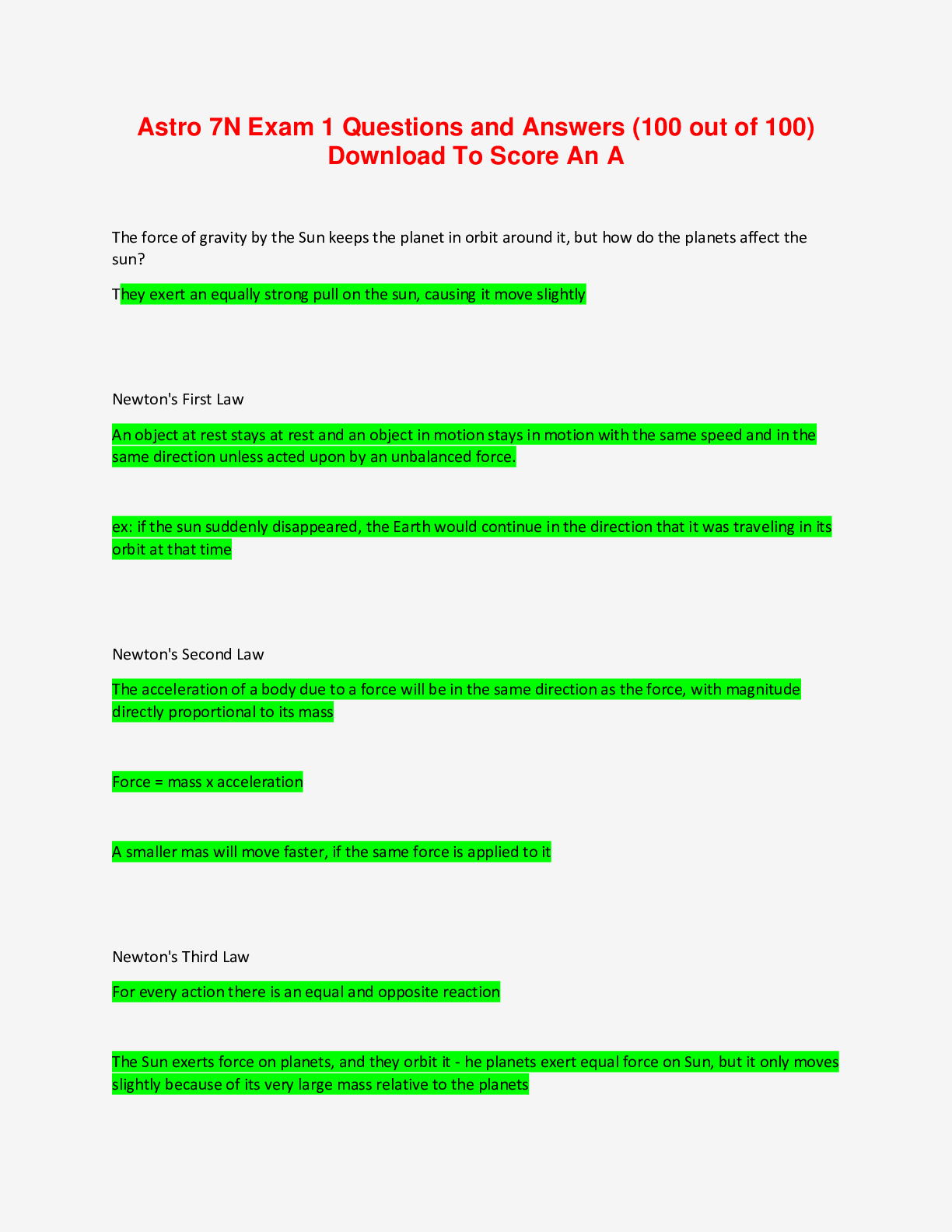
 AG21.png)
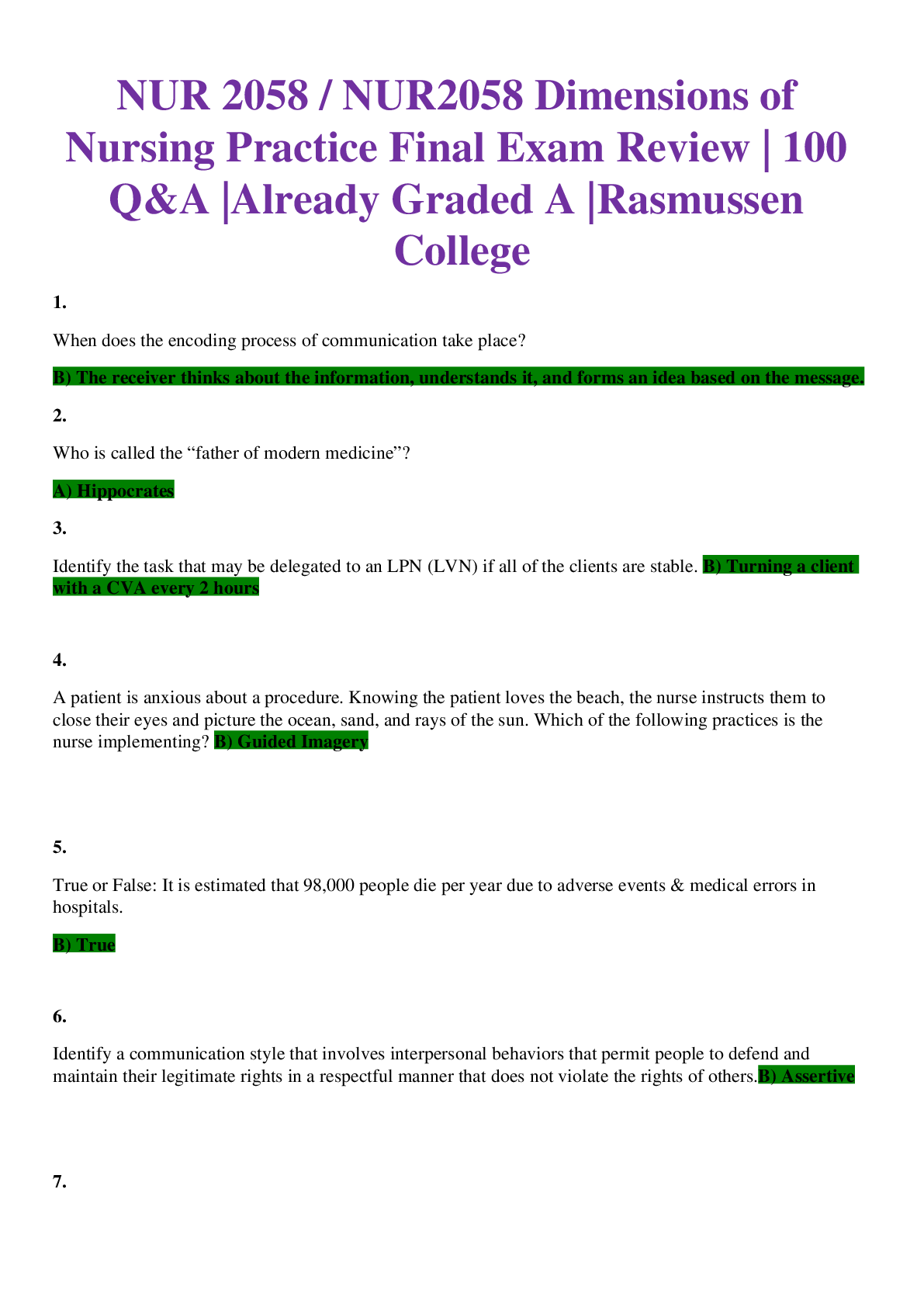
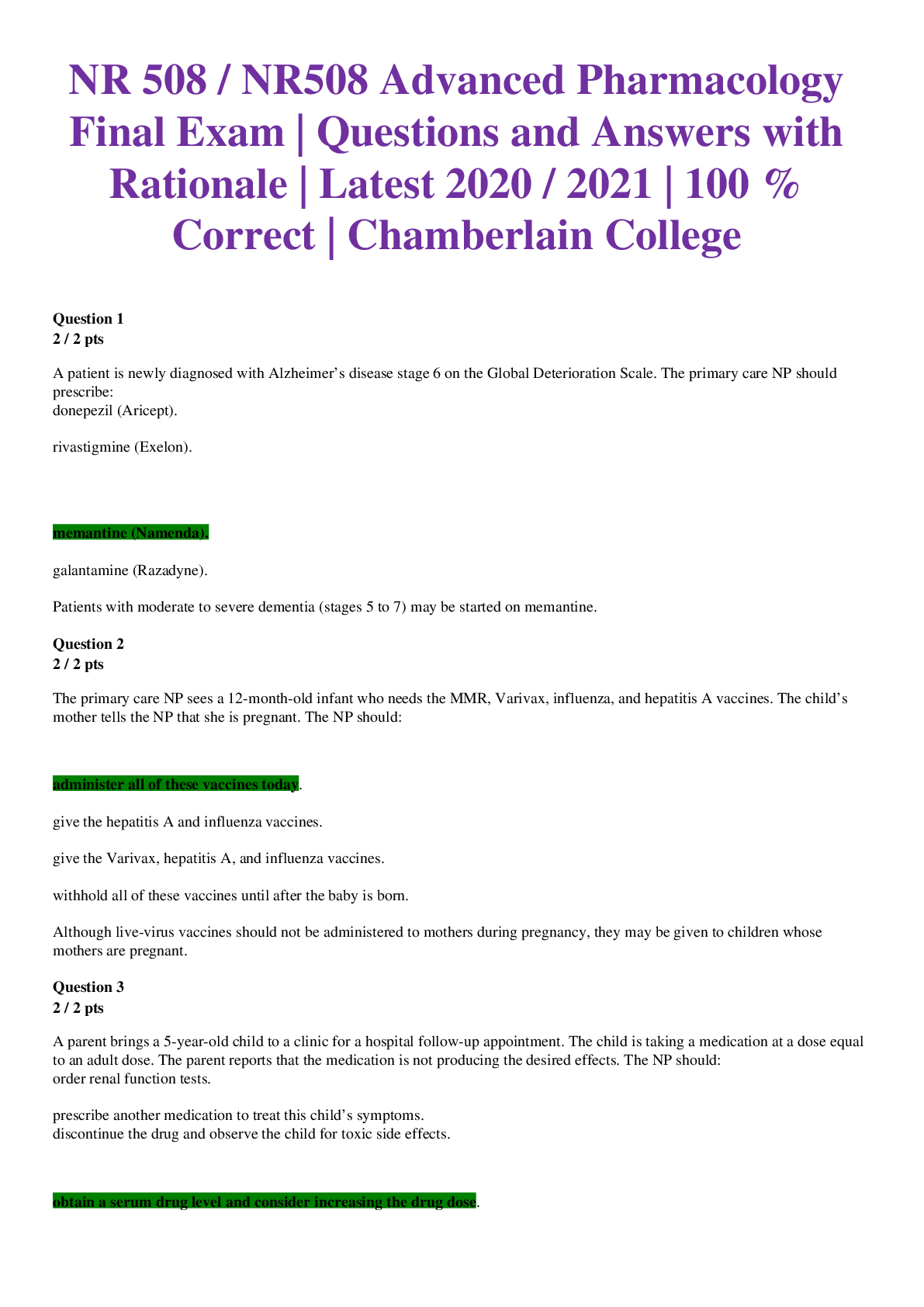
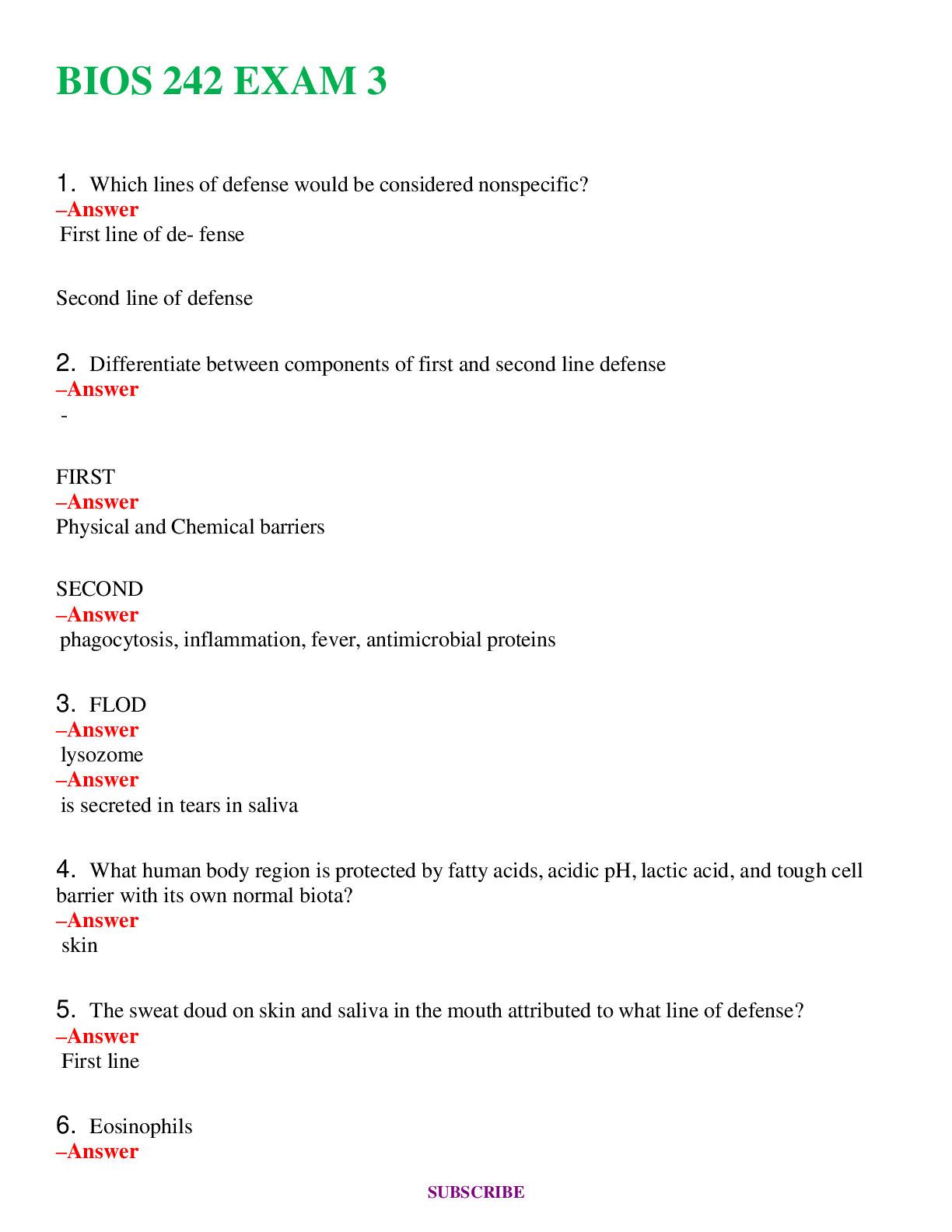
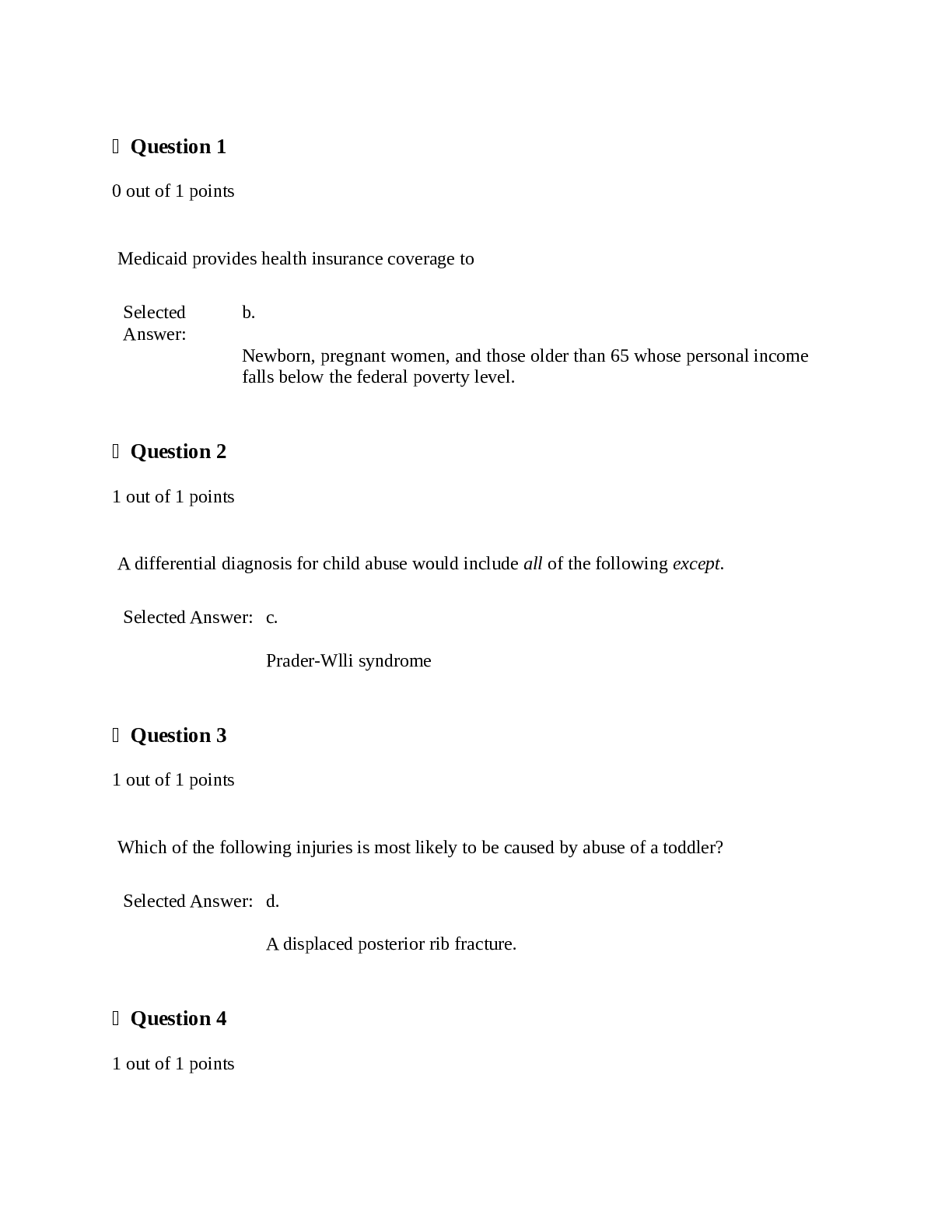
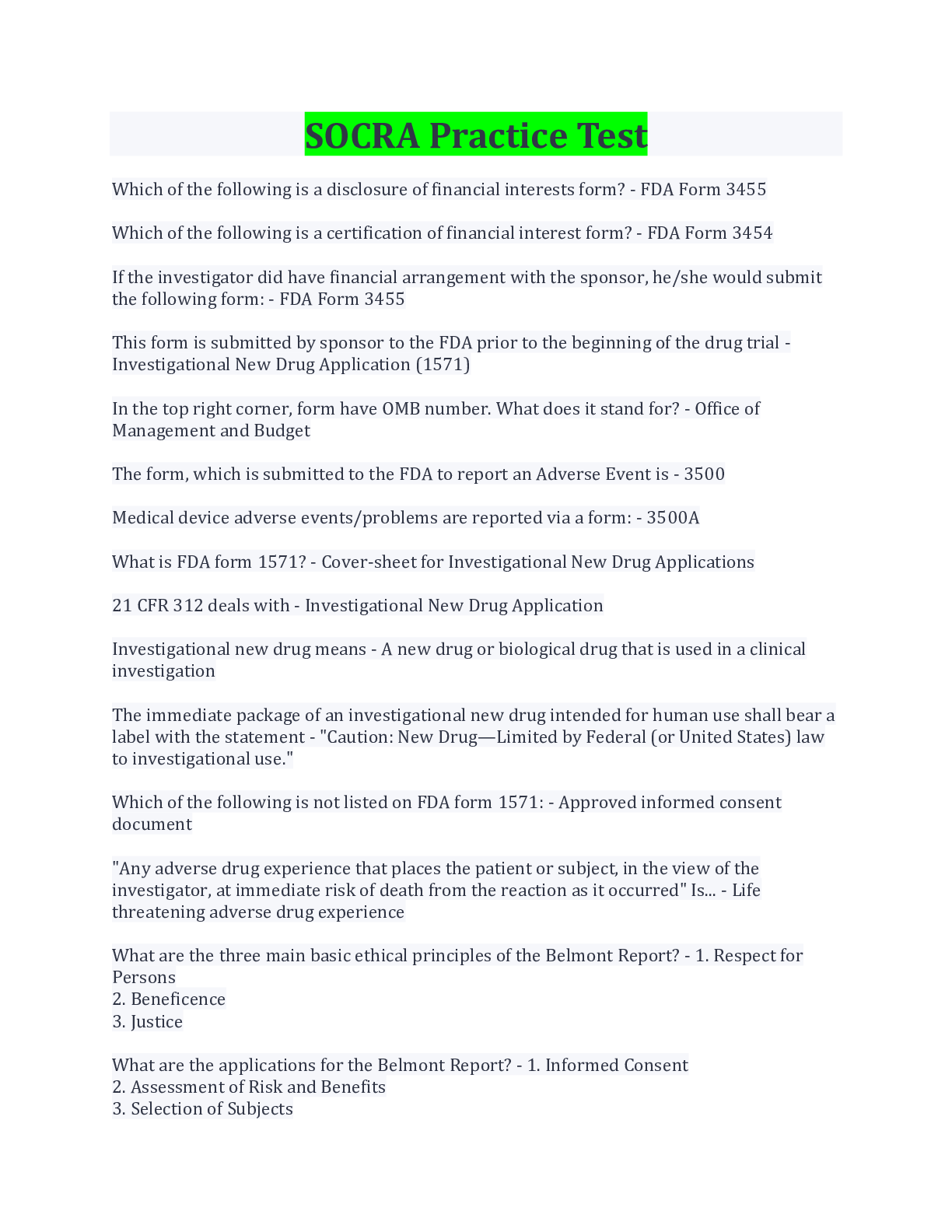
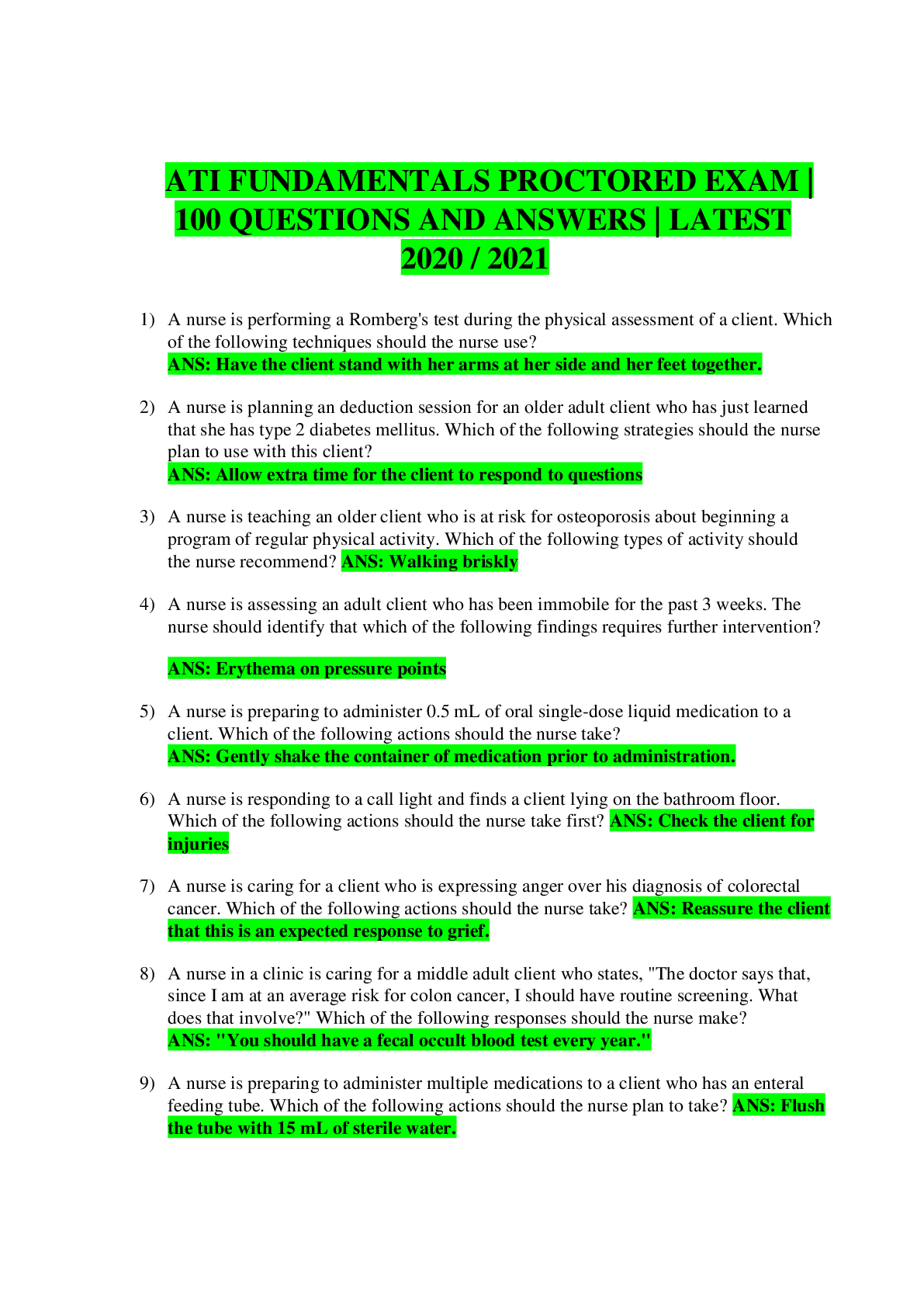
 Rasmussen.png)
 F21.png)
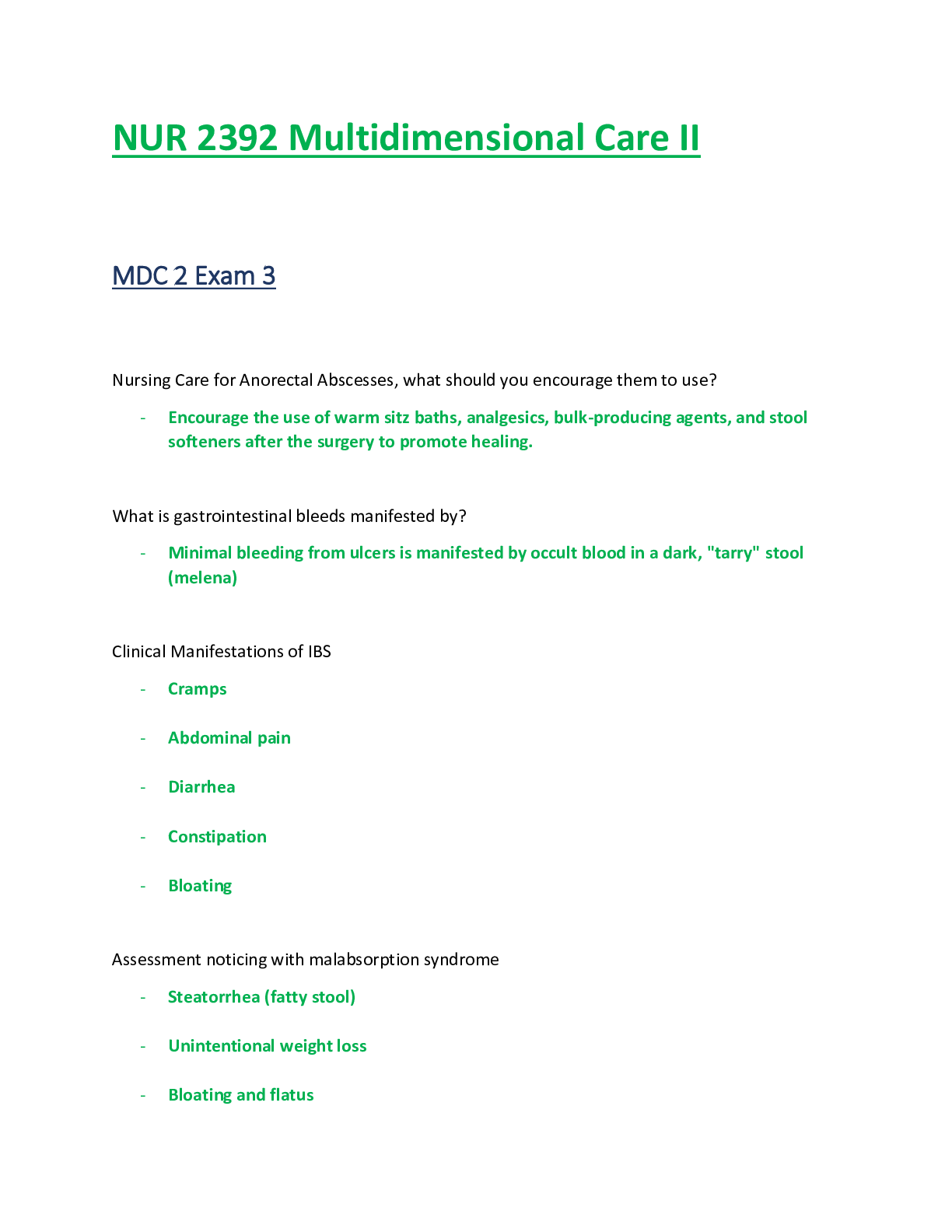
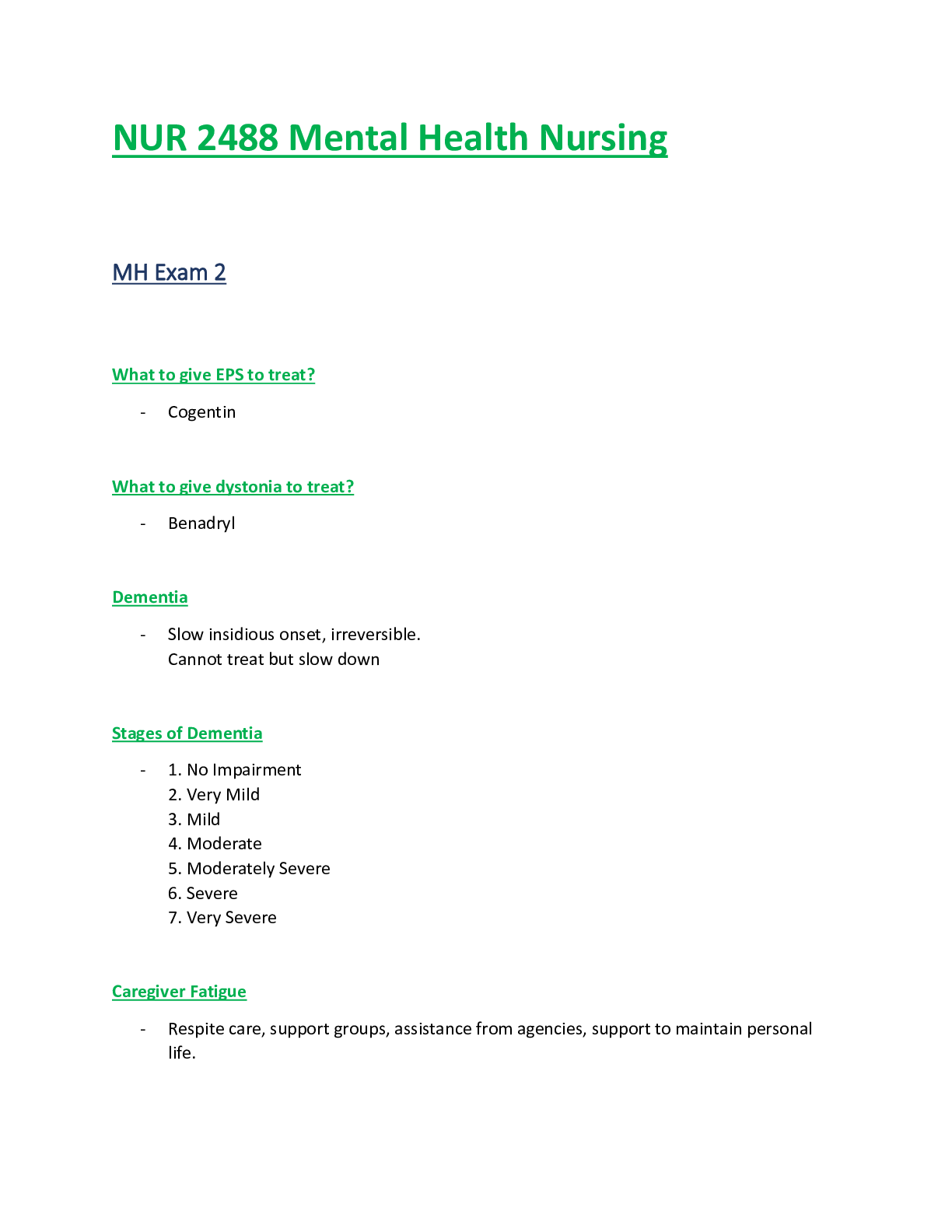
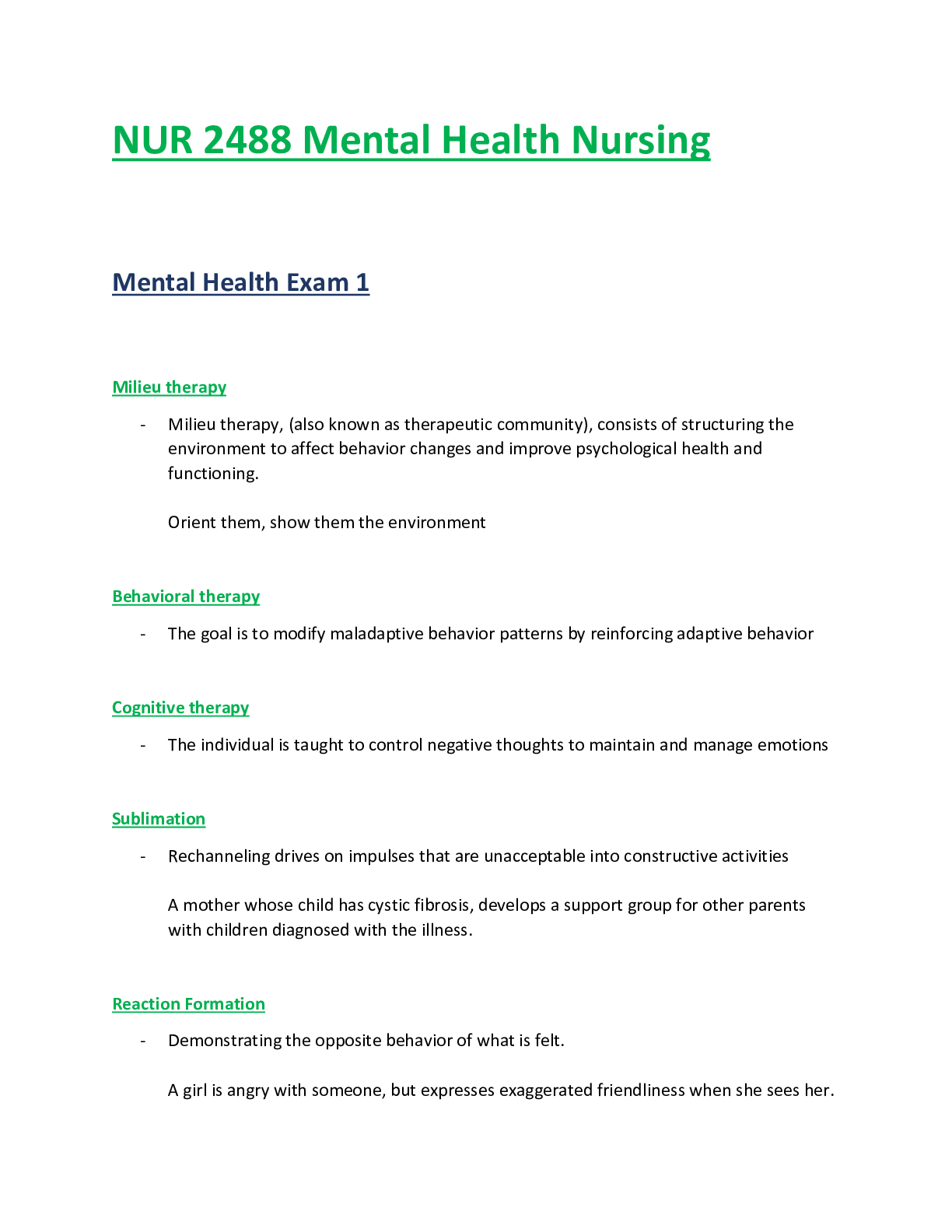
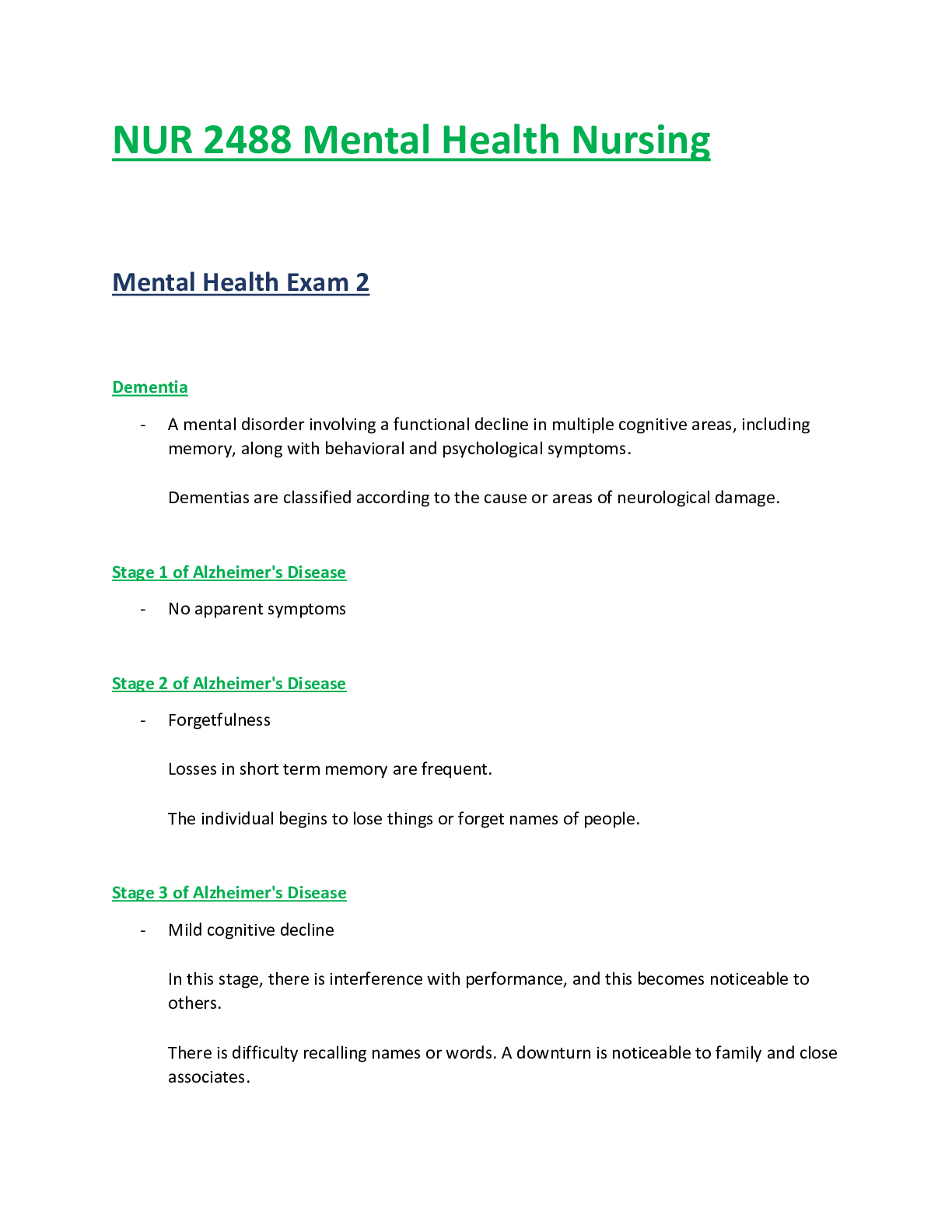
 J21.png)
